The Promised Messiah
Introduction
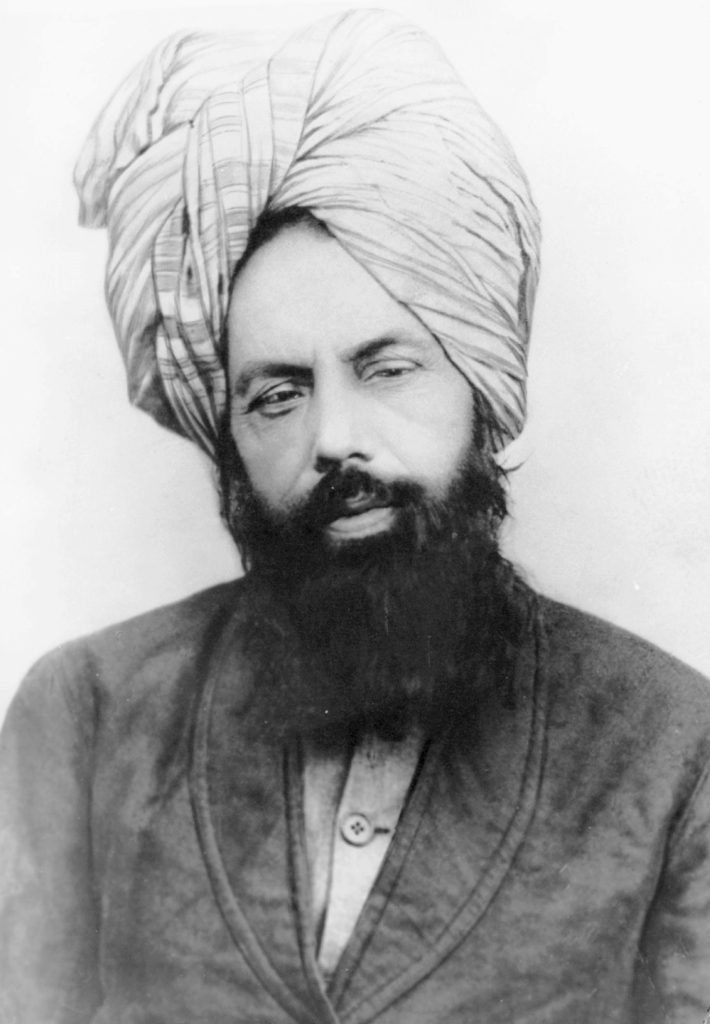
While the beliefs of the Ahmadiyya Muslim Community can be explored in detail here, these pages will focus on the life and times of the Promised Messiah, Hazrat Mirza Ghulam Ahmad. His was a special life, one of immense success in the face of immense hardship, leaving a legacy that resonates more and more strongly in every region of the world.
Before moving directly presenting a life sketch, this page presents various different sources for learning about the life of Hazrat Mirza Ghulam Ahmad.
Sources
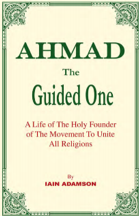
For the reader seeking an impartial view, the biography by a non-Muslim, Iain Adamson, is perhaps the first port of call. Ahmad, The Guided One is a review of his life and claims. Ahmad’s life and Adamson’s skill makes for a stirring read.
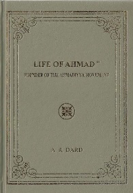
A biography of more detail is Life of Ahmad — Founder of the Ahmadiyya Movement, written by Abdur Rahim Dard. Dard was a companion of the Promised Messiah, and the first Imam of the historic London Mosque. The biography leaves no stone unturned in bringing you to witness the remarkable life of Ahmad.
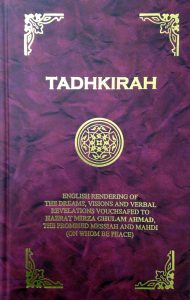
Another invaluable source is a collection of revelations of the Promised Messiah, named Tadhkirah. This volume, with a page count numbering over 1000, gives an intimate sketch of Ahmad’s spiritual life. Tadhkirah is composed of Ahmad’s own recounting of God’s revelations, stretching from his early life to his last days. This unique volume allows one to glimpse into the soul of a Prophet.
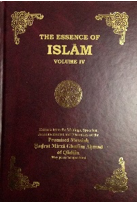
Finally we have Essence of Islam Vol. 4. This volume again collects writings from Ahmad’s own corpus, this time exploring his claims and arguments in detail. This volume is perfect for those wishing to explore the specific theological claims of the Promised Messiah.
Further resources can be found here.
Videos
Below are some videos from the Ahmadiyya Muslim Community on the life of the Promised Messiah:
Promised Messiah And The Timeline Of History
Messiah of the Age
Second Coming of the Messiah
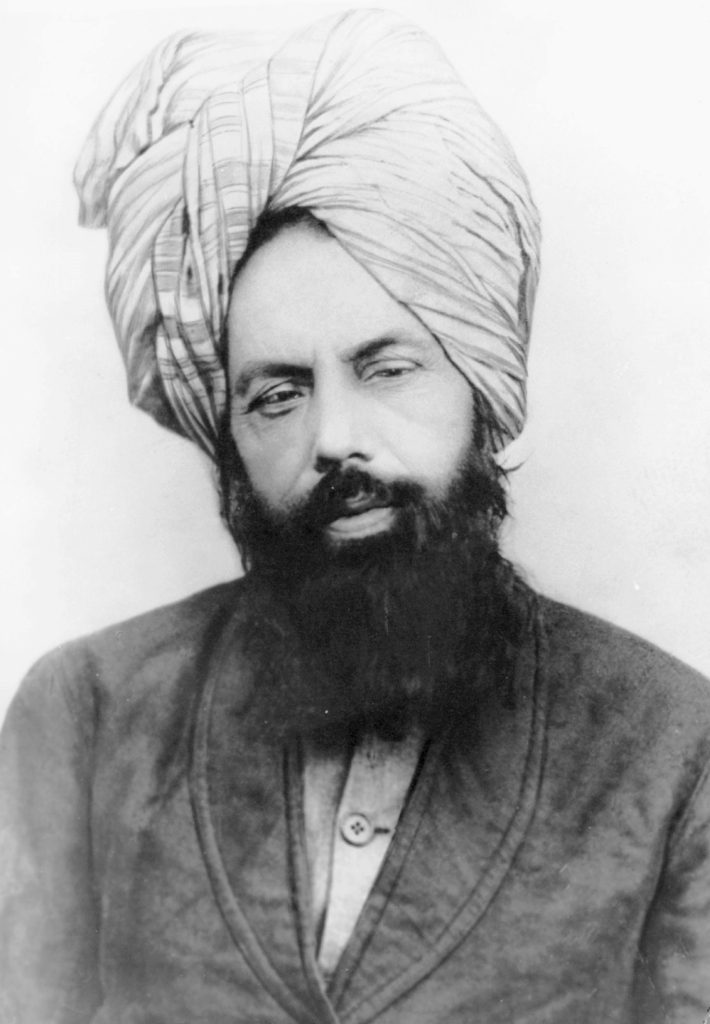
Hazrat Ahmad
By Mirza Bashirrudin Mahmood Ahmad
Second Khalifa of the Ahmadiyya Muslim Community
The following pages give a life sketch of Hazrat Mirza Ghulam Ahmad, the Promised Messiah. The material is directly adapted from a book written by Hazrat Mirza Bashiruddin Mahmood Ahmad, the son of the Promised Messiah and the second Khalifa of the Ahmadiyya Muslim Community. The foreword is written by Hazrat Muhammad Zafrullah Khan, one of the companions of the Promised Messiah and a renowned scholar, jurist and statesman. The book constitutes a perfect introduction to the life and times of His Holiness — “Hazrat” — Mirza Ghulam Ahmad.
Foreword
The closing years of the nineteenth and the opening years of the twentieth century witnessed the transition from one epoch of human history to another. Since then man’s daily increasing knowledge of the laws of nature and his growing mastery of its forces have added a new dimension to human life on earth. This tremendous upheaval has released a bewildering variety and complexity of problems in every sphere of life. While some sort of adjustment and co-ordination are in the process of being worked out in the physical sphere, moral and spiritual values are demonstrably fighting a losing battle and there does not appear to be much chance of their making a firm stand, leave alone advancing boldly forward against the forces of disintegration.
The prospects are bleak and cheerless. The safeguarding of these values is pre-eminently the task of religion, and religion appears supine on the ground and helpless in this confrontation. It seems more than likely that it may soon be swept out of the way by the surging forces of so-called modernity and progress. The terrible truth is that all progress is impelling mankind towards chaos and annihilation rather than towards security and prosperity. The physical and the material have become the sole concern and pre-occupation of man. He is totally beguiled, and has no thought to spare for the morrow and the Hereafter. Yet, what shall it profit a man if he gains the whole world but loses his own soul?
Is there, then no help, while the guides and guardians of the spirit are beginning to repudiate God Himself, by asserting that God is no more than the centre of our being, and proclaiming boldly: God is dead?
Indeed, there is:
“Allah-there is no God but He, the living, the Self-Subsisting and All-Sustaining. Slumber seizes Him not, nor sleep. To Him belongs whatsoever is in the heavens and whatsoever is in the earth. Who is he that will intercede with Him except by His permission? He knows what is before them and what is behind them, and they encompass nothing of His knowledge except what He pleases. His knowledge extends over the heavens and the earth; and the care of them burdens Him not; and He is the High, the Great”
Holy Qur’an, 2:256
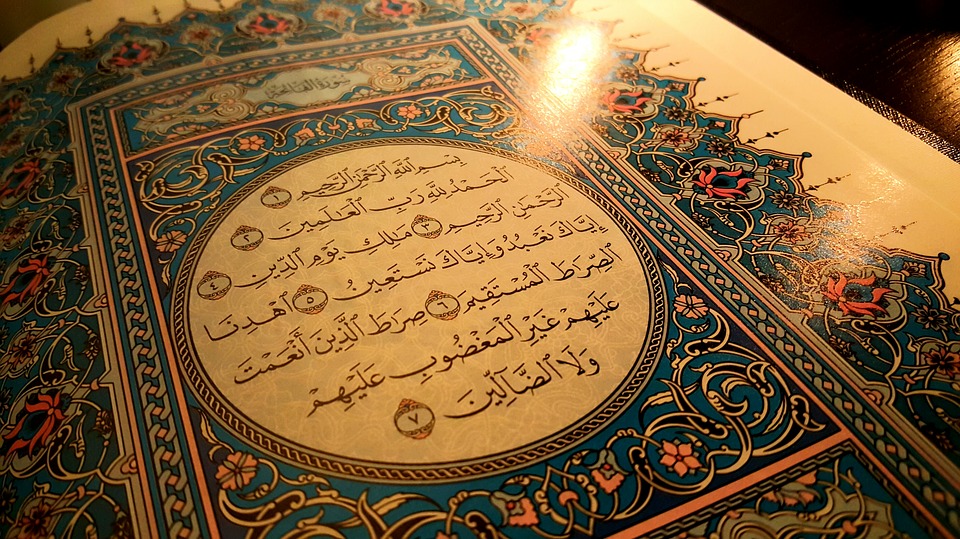
If this is so, why does God not manifest Himself in this age as He has done so in the past? Why are His attributes not in operation today, as they were in the past? When it is said: ‘God is dead’, why does not God proclaim: ‘I am not, I am the Ever-Living, the Self-Subsisting, the All-Sustaining’?
God’s attributes are eternal and are in operation all the time. He manifests Himself today as He did in ages past, and by the same tokens, He furnishes guidance, adequate for all contingencies, at all times. He reveals Himself constantly to those of His servants who strive after Him.
All the contingencies and complexities of this epoch lie open before Him, and He has, in His perfect wisdom, made provision for all of them. Only He has left it to the free choice of each of His creatures to choose and follow the Path of guidance and security or that of error and ruin.
The comprehensive guidance is contained in the Quran, the verbal revelation vouchsafed to the Prophet of Islam (on whom be peace) during a period of 22 years (610-632 C.E.). The Quran prophesied a spiritual Second Advent of the Holy Prophet in the latter days (62:4). Indeed, a spiritual Second Advent of many Prophets, e.g., Jesus Christ, Buddha, Krishna has been foretold in various scriptures and holy books of different faiths, and the time of their advent appears to have been the same, namely, the end of the nineteenth century of the Christian era. Now, a moment’s reflection would show that all these prophecies were to find their fulfilment in the advent of one person, for Truth is indivisible, and guidance for mankind and the remedy for the ills of the age must be uniform, comprehensive and consistent.
The Promised One was Ahmad of Qadian (1835-1908) who became the recipient of revelation in 1876, which continued with increasing frequency till his death (26th May 1908). He was a sincere and devoted servant of the Holy Prophet of Islam and was a person of blameless life and of the highest spiritual stature. In 1891 he proclaimed that God had revealed to him that he was the Promised Messiah of the latter days. One of his revelations described him as the champion of Allah in the chamber of Prophets. He announced that one of his principal functions was to set forth from the Quran, in the light of revelation vouchsafed to him, the guidance needed by mankind in the epoch that lay ahead, which he described as bearing the same relationship to his age as the age of Adam. In the discharge of that function he displayed before the wondering eyes of seekers after Truth a vast and seemingly limitless treasury of knowledge, philosophy, guidance, wisdom and truth from the Quran. In fact, he disclosed to mankind a new and splendid spiritual universe which was contained in the Quran. The moral and spiritual values inculcated by the Quran and illustrated- in their perfection by the Holy Prophet were revived by him, so that men could profit not only from his precept but also from his example. In short, he was appointed to set forth God’s answer to the vast complexity of the problems of the coming epoch. He enjoyed communion with his Maker, and pointed out the way to that communion for all seekers, so that today, in far corners of the earth, his disciples are blessed with that experience and bear testimony to it. His prophecies continue to be fulfilled in all parts of the earth and furnish testimony to his righteousness and the truth of his claim. The guidance set forth by him has proved the salvation of millions to whom it has brought peace of mind and inner serenity in the midst of a world beset with turmoil and all kinds of tribulations.
This small booklet sets forth in a nutshell some of the events of his career, furnishing glimpses of his life and character wholly inadequate to satisfy the ardent and eager curiosity of a scholar or a seeker, but better than no information at all. Indeed, the absence of an authentic and comprehensive account in the English language of his life, character and message, has been a serious gap which must be filled to counteract the malaise which is corroding the foundations of moral and spiritual life over the greater part of the globe. This booklet was written in Urdu by his son and Second Successor, Sahibzada Mirza Bashir-ud-Din Mahmood Ahmad (1889-1965) in 1916, only eight years after Ahmad’s death, and was first published in English in 1917. This date should be kept in mind by the reader to obviate misunderstanding and confusion. The author himself accomplished the fulfilment of one of the grandest prophecies of the Promised Messiah, made and widely published in February 1886. He became the Head of the Ahmadiyya Movement in March 1914, and led the Movement, in the face of the severest opposition which on occasion swelled into bitter and brutal persecution, from one victory to another, till his death in November 1965.
Zafrulla Khan, The Hague
July 1967
Early Life
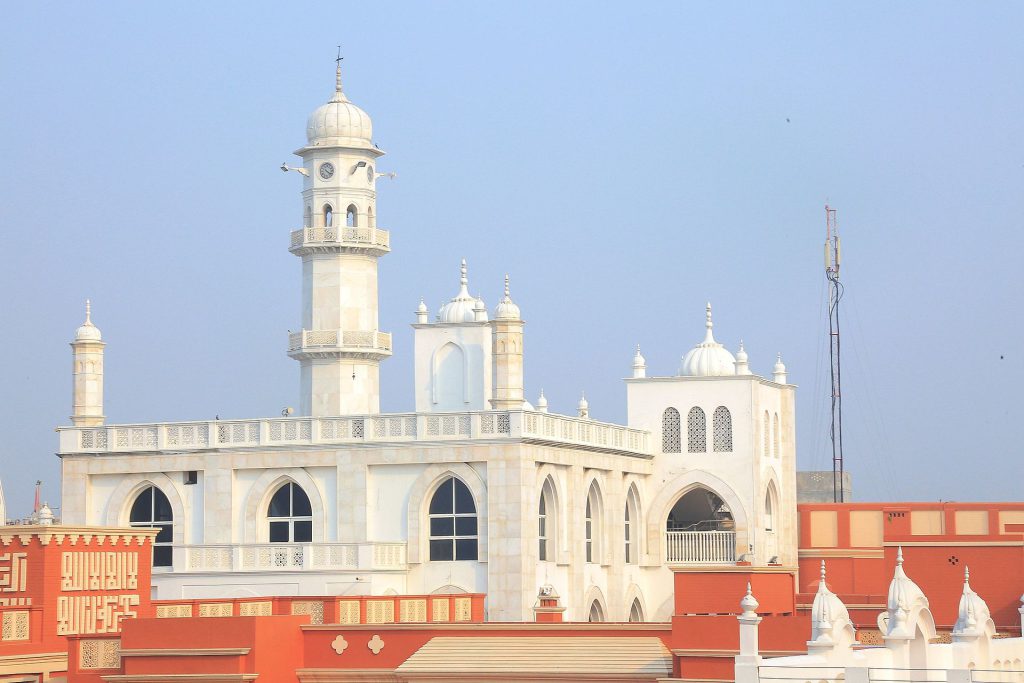
The full name of Ahmad, the Founder of the Ahmadiyya Movement, was Mirza Ghulam Ahmad. He belonged to Qadian, a village situated 11 miles to the east of Batala railway station, and 35 miles from Amritsar and about 70 miles from Lahore. He was born in 1835 in the same village. His father was Mirza Ghulam Murtaza. He was born a twin on a Friday. His twin, a girl, died shortly after. Before proceeding to describe his life, it would be helpful to give a brief description of the family into which he was born.
The Family
The family was one of the most respectable in the land and traced its pedigree to Barlas, uncle of Emperor Timur. When that conqueror captured Kush, which was then ruled by his uncle, the latter moved with his family to Khorasan. There the family lived for a long time. In the tenth century of the Hijra, corresponding to the early part of the sixteenth century of the Christian era, a member of the family, Mirza Hadi Beg, emigrated to India with about 200 followers and founded a settlement at a place in the neighbourhood of the river Bias. He founded a village nine miles from the river and named it Islampur (the city of Islam). As he was a very noble person, he was appointed by the Central Government at Delhi to the office of Qazi [Judge] of that part of the country. The appointment occasioned a change in the name of the village, from Islampur to Islampur Qazi, signifying that it was the seat of the local Qazi.
Gradually in common parlance Islampur was dropped and only Qazi remained, which the local pronunciation changed to Qadi and ultimately converted to Qadian. The village continued to be the seat of the family and though living far from the imperial capital at Delhi, the members of the Moguls declined and the Punjab was torn into petty fiefs, the family remained in quasi-independent possession of Qadian and its surrounding country measuring about 60 square miles. Then the Sikhs came into power and those of Ramgarh entered into a league with some of the neighbouring families and started a campaign against Qadian. Ahmad’s great grandfather managed somehow during his lifetime to ward off their attacks, but in the time of his son the State was gradually so reduced so that only the village of Qadian itself—which was then like a fortress, and was encircled by a moat—remained with the family.
Eventually, through the treachery of some of its inhabitants, the village itself was captured by the Sikhs and all the members of the family, male and female, were made prisoners. After some time the Sikhs permitted them to depart and they moved to the State of Kapurthala, where they remained for a number of years. When Maharaja Ranjit Singh gradually brought all the petty chiefs of the country under his sway, he restored to Ahmad’s father a considerable portion of his paternal estates and he and his brothers entered the military service of the Maharaja. When the British supplanted Sikh rule, the family jagirs [land grants] were confiscated, but Ahmad’s father was granted proprietary rights over the village of Qadian and was recognized as the superior landlord of two neighboring villages. The following extract from the Punjab Chiefs by Sir Lepel Griffen and Col. Massey is relevant in this context.
“In 1530, the last year of the Emperor Babar’s reign, Hadi Beg, a Mughal of Samarkand, emigrated to the Punjab and settled in the Gurdaspur District. He was a man of some learning, and was appointed Qazi or Magistrate over seventy villages in the neighborhood of Qadian, which town he is said to have founded, naming it Islampur Qazi from which Qadian has by a natural change arisen. For several generations the family held offices of responsibility under the Imperial Government and it was only when the Sikhs became powerful that it fell into poverty.
“Gul Muhammad and his son, Ata Muhammad were engaged in perpetual quarrels with the Ramgariha and Kanhaya Misals, who held the country in the neighborhood of Qadian: and at last, having lost all his estates, Ata Muhammad retired to Begowal where, under the protection of Sardar Fateh Singh Ahluwalia, he lived quietly for twelve years. On his death, Ranjit Singh, who had taken possession of all the lands of the Ramgarhia Misal, invited Ghulam Murtaza to return to Qadian and restored to him a large portion of his ancestral estates.’
“He then, with his brothers, entered the army of the Maharaja and perfolined efficient service on the Kashmir frontier and at other places.’
“During the time of Nao Nihal Singh, Sher Singh and Darbar, Ghularn Murtaza was continually employed on service. In 1841 he was sent with General Ventura to Mahadi and Kulu, and in 1843 to Peshawar in command of an infantry regiment. He distinguished himself in Hazarat at the time of insurrection there; and when the rebellion of 1848 broke out, he remained faithful to his Government and fought on its side. His brother, Ghulam Muhi-ud-Din, also did good service at this time. When Bhai Maharaja Singh was marching with his force to Multan to the assistance of Divan Mul Singh. Ghulam Muhi-ud-Din, with other jagirdars, Langar Khan, Sahiwal and Sahib Khan Tiwana, raised the Muhammandan population, and with the force of Misra Sahib Dayal attacked the rebels and completely defeated them, driving them into the Chenab, where upwards of 600 perished.’
“At annexation the jagirs of the family were resumed but a pension of rupees seven hundred (Rs. 7(0) was granted to Ghulam Murtaza and his brother, and they retained their proprietary rights of Qadian and the neighbouring villages. The family did excellent service during the mutiny of 1857. Ghulam Murtza enlisted many men, and his son, Ghulam Kadir, was serving in the force of General Nicholson when that officer destroyed the mutineers of the 46th Native Infantry who had fled from Sialkot, at Trimughat. General Nicholson gave Kadir a certificate stating that in 1857 the Qadian family showed greater loyalty than any other in the district.
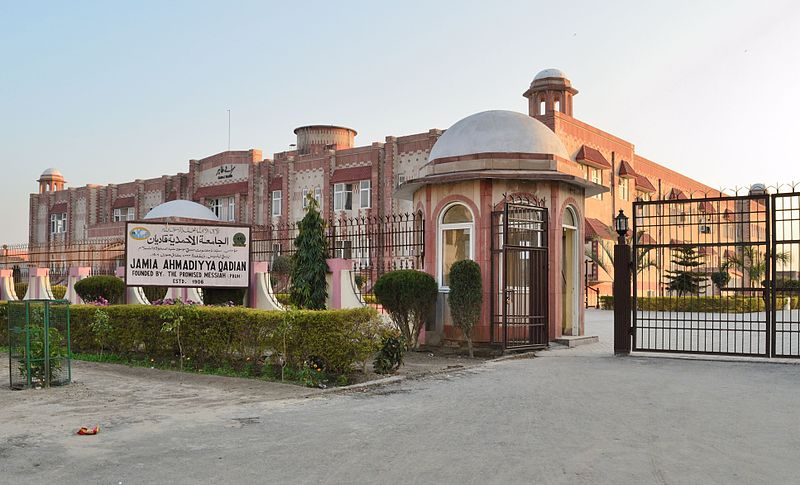
“Ghulam Murtaza, who was known as a skillful physician, died in 1876, and was succeeded by his son, Ghulam Kadir. The latter was always active in assisting the local authorities, and possessed many certificates from officers connected with the administration. He served for a time as Superintendent of the Gurdaspur District Office. His only son died in early youth and he adopted his nephew, Sultan Ahmad, who since Ghulam Kadir’s death in 1883 has been regarded as the head of the family. Mirza Sultan Ahmed entered the service of Government as a Naib Tahsildar and is now an Extra Assistant Commissioner.
“Mention must be made of Mirza Ghulam Ahmad, younger son of Ghulam Murtaza and founder of the remarkable religious movement known as the Ahmadiyya. Born in 1835 he received an excellent education, and in 1891 he declared himself to be the Promised Mahdi or Messiah of the Muslim faith. Being a skilled theologian and dialectician, he soon won over a large number of people to his tenets, and the Ahmadiyya sect now claims to number as many as 300,000 adherents in the Punjab and other parts of India. The Mirza was the author of many works in Arabic, Persian and Urdu, in which he combated the doctrines of Jehad, and these are believed to have a considerable influence among Muhammadans.
“His life was for many years a stormy one, as he was constantly involved in disputes and litigations with his religious opponents. But by the date of his death, which took place in 1908, he had attained a position in which he commanded the respect even of those who disagreed with his views.“His life was for many years a stormy one, as he was constantly involved in disputes and litigations with his religious opponents. But by the date of his death, which took place in 1908, he had attained a position in which he commanded the respect even of those who disagreed with his views.
“His life was for many years a stormy one, as he was constantly involved in disputes and litigations with his religious opponents. But by the date of his death, which took place in 1908, he had attained a position in which he commanded the respect even of those who disagreed with his views.
“His life was for many years a stormy one, as he was constantly involved in disputes and litigations with his religious opponents. But by the date of his death, which took place in 1908, he had attained a position in which he commanded the respect even of those who disagreed with his views.
“His life was for many years a stormy one, as he was constantly involved in disputes and litigations with his religious opponents. But by the date of his death, which took place in 1908, he had attained a position in which he commanded the respect even of those who disagreed with his views.
“The headquarters of the movement remains at Qadian where the Anjuman-i-Ahmadiyya has founded a large school and a printing press for the dissemination of news connected with the movement. The spiritual successor of Mirza Ghulam Ahmad is Maulvi Nur-ud-Din, a well-known physician who was for some years in the service of the Maharaja Kashmir. Few of Ghulam Ahmad’s own relations are followers of his teachings.
“The family owns the whole large village of Qadian in proprietary right, and also levies talukdari of five percent on the revenue of three neighbouring villages.”
Birth and Childhood
I now proceed to narrate the events of the life of Ahmad. I have already said that he was born some time in 1835, when the star of his father’s fortunes was still in the ascendance. The possession of his jagirs and his rank in the Maharaja’s army had given him a good position in life. It was, however, the will of Providence that Ahmad should be brought up in conditions which should direct his attention towards God. It thus happened that within five years of his birth, Maharaja Ranjit Singh died and with his death the Sikh power began to decline. This involved Ahmad’s father in vicissitude, which came to a head at the time of the British rule in the Punjab, when his properties were confiscated: and though he spent thousands of rupees in the endeavour to recover his jagirs, his efforts proved of no avail. This reversal of his fortunes continued to afflict his mind till his death. We find mention of this is one of Ahmad’s books. He says,
“My father in consequence of his many disappointments was always pensive and sad. He had spent close upon 70,000 rupees in litigation, which was bounded to prove fruitless, because the lands which had belonged to our forefathers had long passed out of our possession and their recovery was but a forlorn hope. The failure of his unavailing efforts with its consequent sorrow and grief made my father’s life miserable and the sight of the same helped me to work a holy change in my own life, for the misery of his constantly urged me towards an immaculate life free from all worldly turmoils. He still remained master of a few villages and received an amount from the British Government as reward for good service, besides the pension of a certain post he had held. Since all this was very inconsiderable compared to that which he had once enjoyed, he was always depressed and melancholy, and often gave vent to his sorrow saying that the pains he had taken to secure vile worldly possessions, had they been borne for the sake of religion, would have served to make him a saint. He would also recite some of his own verse bearing on the futility of worldly pursuits.
“Towards the end of his life the feeling of remorse at having to appear empty handed before the August Master daily grew upon him and many a time he used to say sorrowfully:
“I have squandered away my life in pursuit of the vanities of this world.”
From the above extract in which Ahmad has described the state of mind of his father during his own childhood and youth, it would appear that the circumstances under which he received his own early training were so disposed by God that the love of the world could never find a place in his heart. It is true that even the reduced circumstances of his father and his elder brother were such that by the worldly people they were considered honoured and eminent, and by the officials of the State they were treated with regard and consideration. Nevertheless, their solicitude for material advantages and their life-long struggle for the same and their failure to win them in a measure to which they considered themselves rightly entitled by reason of their family status were sufficient to impress upon the pure and undefiled soul of Ahmad the truth that the life of this earth is transitory and in the end one must render its account to one’s Creator. This was the lesson he learnt in his childhood, and he learnt it so well that he did not forget it till his last hour. Though the world approached him in its most alluring garbs and tried to tempt him from his path, never did he pay the least attention to it. Once estranged from it he never made it up with it again.
Thus in his early childhood he had observed such a bitter object lesson in the life of his father that it turned his heart cold towards the world forever. At a very early age his whole mind was centred upon winning the pleasure of the Almighty. His biographer, Shaikh Yakub Ali, relates a very significant anecdote of his childhood, when he exhorted a girl playmate, whom he later married: ‘Pray for me, miserable one, that I may be granted the grace of prayer.’ In this brief exhortation uttered while he was still a mere child we may discern the quality of the emotions that surged through his heart even at that early age, and perceive that even then the goal of his desires was God and God alone. We can, moreover, observe the insight he had already developed in those early years. He had come to recognize that God alone has the power to bring about the fulfilment of all desires and realized that even the grace of prayer is a gift which is only in God’s power to bestow. This yearning for the grace of prayer and this realization that it was God alone who could satisfy in the mind of a child of tender years around whom the young and the old were all devoted to worldliness is proof that his heart was entirely free from the defilements of the world and was in receipt of special Divine assistance for the working of a mighty change in the world.
Early Education
He was born in an age of darkness when little thought was given to learning. During the period of Sikh supremacy, if a person received a letter from a friend, he had to put himself to considerable pains to get it read out to him, and letters often remained long undeciphered for that reason. Many of the aristocracy remained illiterate throughout their lives. But since it was the will of Providence that Ahmad should be prepared to carry out an important divine mission, He put it in the mind of Ahmad’s father to make some provision for his education. Thus it was even in that age of ignorance, notwithstanding all his worldly anxieties, the father did not neglect to provide for him the means of education considered adequate at the time. He was still a child when his father employed for his benefit a teacher named Fazil-Illahi. From him he learned to read the Holy Quran and a few Persian books.
When he attained the age of 10 years another teacher, Fazal Ahmed, was appointed who was a very good and pious man and according to Ahmad’s own account, instructed him with great diligence and affection. With this gentleman he read a few books of Arabic grammar.
When he was 17 or 18 years old he was given still another teacher named Gul A1i Shah. From him he learned more Arabic grammar and also studied logic and philosophy. He also read a few books on medicine under the guidance of his father who was a skilful physician. This measure of education was at that time considered to be an advanced course, though having regard to the momentous nature of the work he was destined to perform, it did not amount to much. The writer has known some of the persons who were fellow students with him and were taught by the same teachers. They were men of mediocre attainments. The teachers, too, who were entrusted with his education were not men of any great learning; for at that time education and scholarship were altogether at a discount and any person who had read a few books of Persian or Arabic was considered to be a learned person.
Thus, neither the circumstances under which nor the teachers under whom he received his education were such as to furnish him the requisite preparation for the great task of his life. The proficiency attained by him consisted merely in the reading of Persian and Arabic, and the ability to express himself fluently in the former and to a limited extent in the latter. His education went no further. As regards religious instruction, he received little of it from any of his teachers. He was, however fond of study, and would remain absorbed in his father’s library for such long hours that his father had to remonstrate with him fearing lest he might injure his health and also seeking to wean him from his studious habits and to engage his interest in his own worldly affairs.
Spiritual Development
Post-Scholastic Period
By the time he finished his education, the British power had already been consolidated in the Punjab. The turbulent times of the Mutiny had passed and the people had come to recognize that the road to advancement lay through service under the British Government. Accordingly many young men of noble families became solicitous for administrative appointments. Similar consideration, coupled with a realization of the fact that the young man took no interest in the affairs of the estate, persuaded his father to counsel him to seek employment with Government. Accordingly, he proceeded to Sialkot and took up an appointment in the office of the Deputy Commissioner. Nevertheless, the great part of his leisure time still continued to be devoted to literary and religious pursuits, and the moment he was free from the duties of his office, he occupied himself either in study, teaching or in religious discussions. His piety and godliness came to be universally recognized, and though he was only a young man of 28 or 30 years, he was held in high esteem by older people from the ranks of the Muslims and the Hindus alike. He possessed a retiring disposition and spent most of his time indoors. This was the period when the Christian missions had newly started their activities in the Punjab, and the Muslims, unfamiliar with their aggressive methods, frequently suffered defeat at their hands. It so happened, however, that whenever Ahmad took part in the discussion, it was the Christians who had to beat a retreat. He thus came to enjoy the regard of such of the missionaries who, notwithstanding a difference of creed, possessed a reverence for truth.
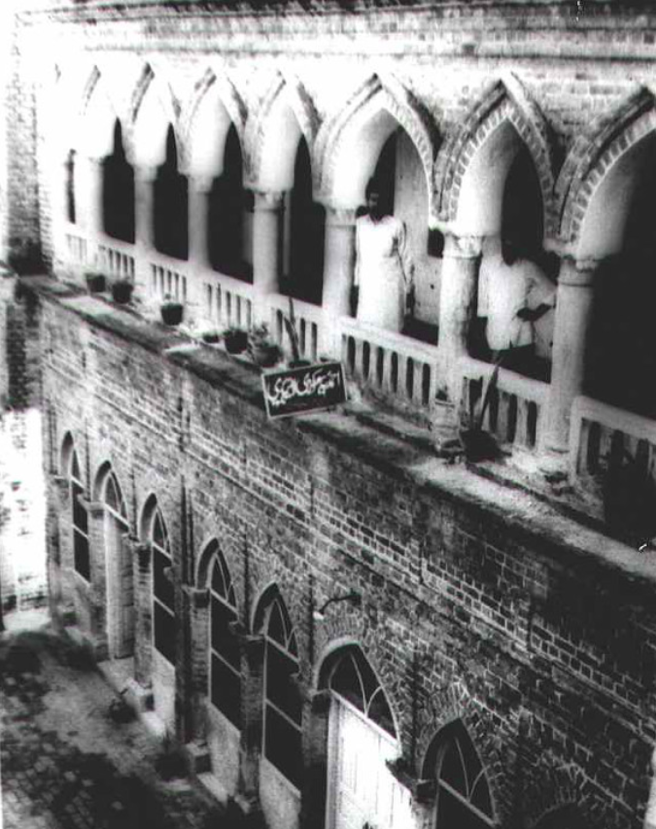
The victory of the British was considered by the missionaries as a prelude to their own triumph, and they were simple enough to imagine that within a short period of time the British Government would force the Muslims to accept Christianity at the point of the sword. This can be gathered from a perusal of the books published by them at that time against Islam. They had no compunction in using the strongest language for Islam and its holy founder, so much so that of the wiser heads among the British officials were forced to observe that it would be no wonder if in consequence of such provocative writings a recurrence of the mutiny of 1857 should take place. This state’ of affairs continued until the missionaries were convinced that the governance of India belonged to British crown and not the missionaries and that Queen Victoria’s Government was not at all in favour of spreading Christianity by the power of the sword and causing an affront to the religious sentiments of any section of the people.
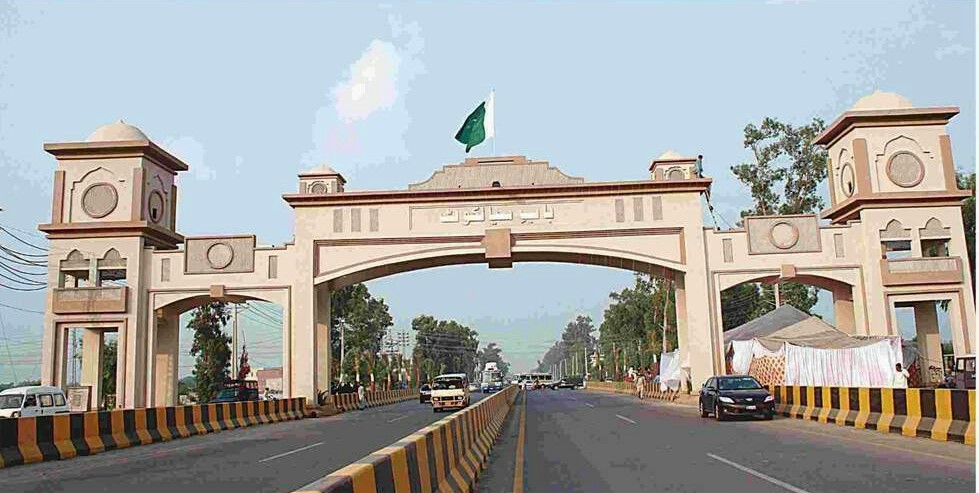
In short, at that time relations between the Muslims and the Christians were under excessive strain, and the civility of the missionaries was extended only to those who reacted to their propaganda in a spirit of assent. Against those who questioned it their wrath knew no bounds. Yet the probity, sincerity and piety of Ahmad had created a very favourable impression upon the Rev. Mr. Butler, the Missionary at Sialkot, in spite of the fact that Ahmad entertained a very jealous regard for his own faith and deferred to no opponent in the field of religious controversy. Mr. Butler knew that he had no chance of winning over his rival to his own faith, that on the contrary it was possible that he himself might be won over by his rival. He may even have resented the intellectual superiority of his rival. In spite of all this Mr. Butler could not help according him treatment which was not accorded to other religious opponents. This was strikingly demonstrated when Mr. Butler was about to depart for England. He called at the Deputy Commissioner’s office and on the latter’s enquiry told him that his purpose was to say goodbye to Mirza Ghulam Ahmad. On being directed, he went straight to him, sat and talked with him awhile and then bade him farewell.
Resignation of Appointment
Ahmad remained in his appointment for four years but with the utmost reluctance. At last, with the consent of his father, he forthwith tendered his resignation and returned home. Then at the request of his father he began to look after the lawsuits connected with the family estate. But his mind was never in the work. His sense of filial obedience persuaded him to carry out his father’s wishes, but he felt no interest in his occupation. At times when he returned home after having lost a case his face looked so cheery that people supposed that the case had been decided in his favour, till enquiry revealed the contrary. On being asked the reason for his cheerfulness he would say that he had done his part of the work and the result was as God had determined it to be, but now that the matter had been disposed of, he was free once more to devote himself to the remembrance of God
This was a period of conflict in his life. His father desired that he should either devote himself to the affairs of the family estate to take up some employment, while he was averse to both these courses. This often brought taunts and ridicule upon him. So long as his mother lived, she acted as a shield for him, but after she died, he was continuously rebuked by his father and his elder brother. They thought that his indifference towards worldly affairs was due to sloth. At times his father felt much distress and wondered how would he manage to make a living after his death. The thought was painful to him that he should have to be dependent upon his brother. Sometimes his father would in his chagrin call him a mullah (village priest) and express his surprise how such a person could have been born in the family. Yet in his mind he entertained a degree of regard for his younger son and at moments when the memories of his worldly failures became acute, he would give expression to a feeling of satisfaction at the sight of his son’s absorption in religious pursuits and would exclaim: ‘The real business of life is what this son of mine is engaged upon. But such moments were few, and since the whole of his life had been devoted to worldly purists, his prevailing mood was one of frustration.
The attitude of his father did not, however, affect the conduct of the son, who sometimes sat by his father and read out to him portions from the Quran and the Hadith. It was a remarkable sight. Father and son were each set upon a different course and each aimed at winning the other over. The father wished by all possible means to persuade the son to adopt his view and to see him employed in seeking worldly advancement. The son desired to see his father freed from the dangerous shares of the world and imbued with the love of God. In short, that was a spectacle which it is not in the power of a pen to portray adequately. It must be left to everyone to picture it for himself according to his own fancy.
At this time the question of service was once more presented to Ahmad for consideration. There was a proposal to appoint him the head of the department of education in the State of Kapurthala. He declined and decided in view of the growing difficulties and anxieties of his father, to stay with him at home and to lend him a helping hand in his affairs, whatever hardships that might entail. It is true, as already been said, that his interest was not engaged in these affairs, yet merely to carry out the wishes of his father and to make his last days as comfortable as possible, he faithfully carried on the work, though its success or failure was a matter of indifference to him.
Remembrance of God in the Midst of Worldly Duties
Though ostensibly occupied in helping his father in his worldly affairs, his mind was fixed on his Maker. The smallest leisure he could snatch from these pursuits he would devote to the remembrance of God. In the many journeys he had to perform during these days in connection with the lawsuits, he never missed his prayers at their proper times. Even when a suit was in progress in court, he would not forego his prayers. On one occasion when he was in attendance at a court to conduct a certain suit, which had an important bearing on many other disputes and a favourable decision in it would secure to him many of his rights, the court was occupied with the hearing of some other case when the hour of prayer arrived. He perceived that the court was still busy with the other case and the time for prayer was passing. He resigned his own case to the care of Allah and retired to a secluded spot, where he performed his ablutions and commenced his prayers under the shade of some trees.
While he was so occupied his case was called, but he continued undisturbed in his prayers and paid no heed to the summons. When his prayer was finished he felt certain that the case must have been decided ex parte, in favour of his opponent. He entered the court room and learnt that the case had been disposed of. He enquired about the decision and was told that the judge had decided the case on the merits after studying the record and had given judgment in his favour. Thus God Himself had worked as his advocate in the case.
In short, he was employed in these worldly duties like one forced to do work against his will, although the work was in his own interest, for as the heir of his father the safeguarding of his father’s property was, in fact, the safeguarding of his own. This indifference towards what was in his own interest was the result of his estrangement from the world and absorption in God.
Industrious Life
Although indifferent to worldly affairs, he was by no means slothful, on the contrary, he was used to hardship. He loved retirement but was never afraid of hard work. When he had to perform a journey, he would often send his servant before him with his mount and himself traverse on foot a distance of 22 or 25 miles to reach his destination. As a matter of fact, most of his local journeys were performed on foot. He seldom made use of any kind of conveyance. This habit of walking he kept till his last days. After he had passed the age of 70 years and was a prey to several serious maladies, he would still in his constitutional walks transverse daily a distance of 4 or 5 miles and sometimes of 7 or 8 miles. In his younger days, he would sometimes rise before the hour of morning prayer (which is due 1 1/4 hour before sunrise) and go for a walk and would reach Wadala (which is about 5 1/2 miles from Qadian on the road to Batala by the time of the morning prayer.
His Father’s Death
He was just over 40 years of age when in the year 1876, his father was taken ill, and though the illness was not serious, the Divine revelation came to him in Arabic meaning: ‘We call to witness that which will happen during the night and thou knowest not that which will happen during the night,’ and he apprehended that the revelation presaged the death of his father, which was to occur after nightfall. This was the first verbal revelation that came to him, although before this he had many experiences of truthful dreams which met with clear fulfilment at their proper times, and to which even Hindus and Sikhs, many of whom are still living, bore witness. In this revelation. God seems to have meant to break to him compassionately that, now that his worldly father was about to leave him, henceforth God Himself would be a Heavenly Father for him.
Thus the first revelation that came to him was the one which prophesied to him the death of his father. The news was naturally of a painful character and made him sad and the thought passed through his mind how after his father was gone, he would make shift. Upon this there came another revelation in which God consoled him and fully allayed his fears. The event is best described in the words of the Promised Messiah himself. He writes:
“When I was informed that my father was to die after sunset, the intimation naturally caused me pain and since the greater part of the family income was bound up with his life, e.g., his pension and the good service annuity he received from the British Government, the reflection passed through my mind what was to happen after his death, and I apprehended that days of poverty and want lay ahead. All this passed through my mind in a moment like a flash of lightning. Immediately I experienced a sense of withdrawal and the second revelation came: ‘Is not Allah All-Sufficient for His servant? The Divine revelation was instantly followed by a deep feeling of relief just as some painful injury is suddenly healed by some potent ointment …. When the second revelation came, I understood that God would not suffer me to perish. I then wrote down the words of the revelation and gave the paper over to a Hindu Khatri, Malawamal by name, who is a resident of Qadian and is still living. I also told him the whole story and sent him to Amritsar, that with the help of Hakim Maulvi Muhammad Shareef of Kalanaur, he should get the words of the revelation inscribed on a stone and the same fashioned into a signet and to bring it back to me. I selected him for the errand simply to make him as well as Maulvi Muhammad Shareef witnesses to this grand prophecy. In due time Maulvi Muhammad Shareef got the signet prepared at a cost of five rupees and forwarded the same to me and it remains with me still. This is an impression of the seal.”
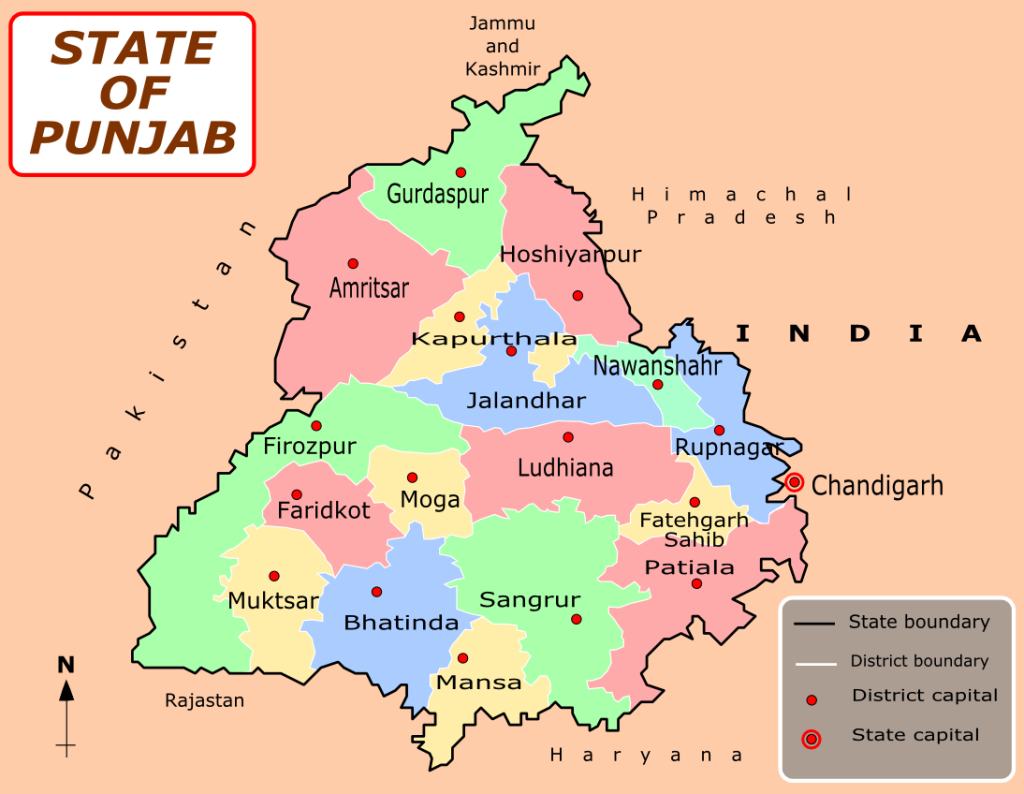
In short, the day on which his father was to die, the same day some hours before evening, a revelation about the coming event came to him and it was accompanied by a reassurance from God that he was not to worry as God Himself would make provision for him. The same day after sunset his father expired and thus began a new chapter in his life.
The property left by his father consisted of certain houses and shops in Batala, Amritsar and Gurdaspur and also houses, shops and lands in Qadian. He and his brother were the only heirs to the property and according to Muhammadan law each of them was entitled to a half share of the same, the income of which was sufficient to meet all his modest needs. However, he did not ask his brother for a division of the property, but left the management of the whole to him, remaining content with whatever his brother chose to give him out of the proceeds. Thus his elder brother came to occupy for him the place of his father. But since he was in employment and lived at Gurdaspur, the younger brother had to endure considerable hardship and had even to suffer want in respect of daily necessities of life. These difficulties continued till the death of his brother.
This was, in fact, a period of trial for him. The patience and fortitude with which he bore the trial was an unmistakable proof of the greatness of his soul, for though he was entitled to an equal share of the property left by his father, yet seeing how fond his brother was of the things of the world, he refrained from demanding his share and remained content with bare subsistence. It is true, his brother in his own way would try to meet his needs and even entertained a sort of affection and regards for him, yet since their two natures were so divergent, the one altogether immersed in worldliness, the other altogether averse to the world, there was ample room for misunderstanding.
His brother, in fact considered him to be a reactionary of slothful habits and would sometimes express his regret that he would not occupy himself usefully. On one occasion, when his younger brother applied to him for a small sum of money to subscribe to a certain paper, he turned down the modest request with the observation that it was a piece of extravagance, and that while he was reluctant to undertake any gainful work, it was not proper that he should waste his time in the useless study of books and papers. Thus the brother being engrossed in worldly affairs, could not appreciate his needs and was not disposed to meet them. This proved a considerable source of hardship for him. What has been more trying was that as his brother, for the most part, lived outside Qadian, during his absence his employees constantly slighted and vexed his younger brother.
Holy Exercises
It was during these days that the command came to him that to win Divine blessing it was necessary for him to undergo a certain amount of holy exercises and that he should observe fasts. In obedience to this command he kept on fasting for six successive months. During this period it often happened that when the midday meal was sent to him from his home, he gave it away to the poor and when in the evening after breaking his fast he sent home for food, the request was met with a flat refusal and he passed the night on only water or the like, and with the next morning began to observe another full day’s fast. This period proved a time of great trial and suffering for him, but he bore it all with extreme patience and fortitude, and even in moments of the greatest difficulty never, by word or sign, demanded his share of the property.
His Self-Abnegation
Not only during the Period of fasting, but even normally it was his habit to distribute the greater part of his food among the poor. Sometimes he would keep for himself only a small portion of a chapati (unleavened bread) not more than two ounces in weight. At other times he would give away the whole of his food and himself subsist on a few grains of roasted gram. It thus happened that there gathered around him a number of poor people who became his constant companions. A remarkable contrast was thus presented by the company which surrounded each of the brothers. Around one were assembled people who were comparatively well-to-do, while around the other were gathered the poor and the needy, their benefactor shared his own scanty morsels and their needs he always preferred to his own.
Early Defence of Islam
His Coming to Public Notice
At this time the Promised Messiah began his work in the service of Islam by contributing articles to various papers in refutation of the attacks of Christians and Aryas against Islam. This brought his name to popular notice, but he continued to live his life of retirement and seldom appeared in public. His time was spent in a small cloister of a mosque, measuring only 6 feet by 5 feet. If any visitor came he was received in the mosque or in the house. Thus even when his name began to be publicly known, he himself still dwelt in solitude.
Continuous Revelations
During the period of self-discipline, he began to receive revelations with greater frequency and often had intimations regarding future events which were fulfilled in due course and strengthened his faith. His friends among whom were several Hindus and Sikhs, witnessed these events with great surprise and wonder.
The Barahin-I-Ahmadiyya
He was now no longer content with contributing articles to the newspapers in deference of Islam. He observed with dismay that the enemies of Islam were getting bolder in their attacks and that the Muslims, unable to withstand their assaults, were daily losing ground. His zeal for Islam was fired and, under Divine revelation, he resolved to write a book expounding the truth of Islam in a manner that would leave its opponents helpless, and stop them from ever after venturing into the field against Islam and, in case any did so, to furnish every Muslim with arguments sufficient to overwhelm such a one. With this resolve he started compiling that mighty work now well-known by the name of Barahin-i-Ahmadiyya, which stands peerless among human productions. When one volume of the book was completed he appealed for help towards its publication, and it was published with the help of such contributions as were received from people who from the articles which had already appeared from the pen of the author had come to recognize his high merits. This first part was only a challenge. The criteria laid down in it for the demonstration of truth were such as to convince every reader of the grandeur of the projected work. In this notice the author announced that if the follower of any rival faith should succeed in proving the existence in his own faith of the numerous excellences of Islam which he would describe in the book or even of half or of a quarter thereof, then the author would make a present to him of all his properties which he valued at ten thousand rupees.
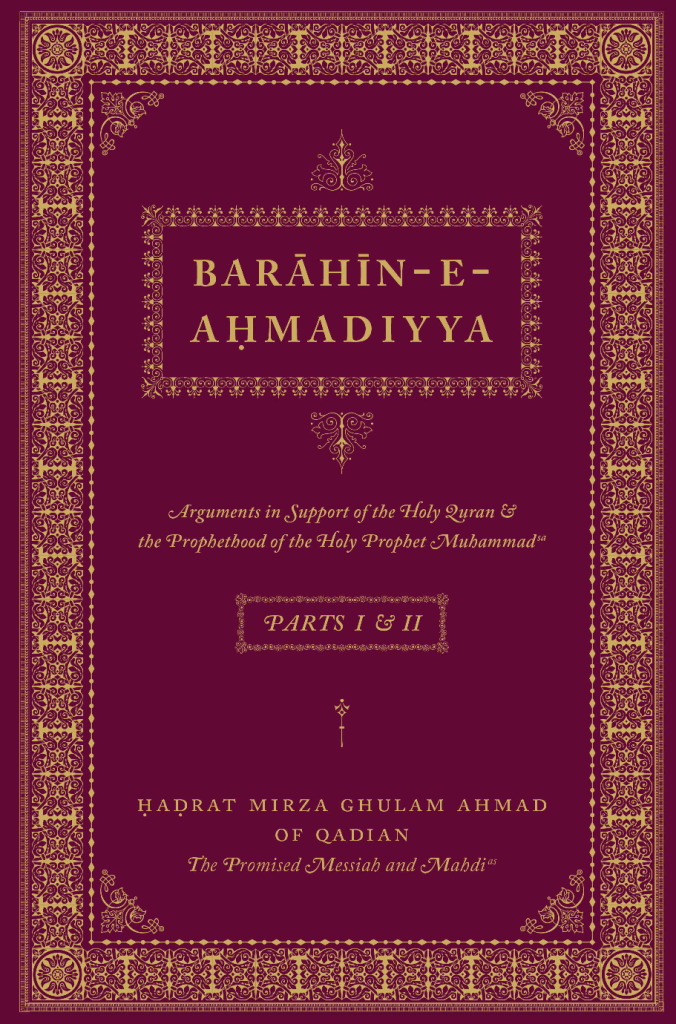
This was the only occasion when he sought to derive some advantage from his properties. He offered them up as prize, so that the advocates of rival faiths might be persuaded to enter the lists against Islam and the victory of Islam be fully established. The first volume of the work was published in 1880, the second volume followed in 1881, the third in 1882 and the fourth in 1884.Then the plan, along which the work was projected had to be laid aside, because while the work was in progress, it was revealed to him that he was destined to serve the cause of Islam in a different manner. Still the work, so far as it was carried, was sufficient to open the eyes of the world. Friends and foes alike acknowledged the high merits of the author. Among the opponents of Islam the work inspired such awe as prevented any of them from venturing upon a refutation. To the Muslims it brought such joy that even in the absence of any claim on his part, they recognized him as the Promised Mujaddid (Reformer) of the age, and many of the eminent theologians of the time acknowledged without any hesitation the superiority of his genius. One of them, Maulvi Muhammad Hussain of Batala, who was at that time the leader of the Ahl-i-Hadis sect and was held in more than ordinary esteem by that community and who, in consequence, was also respected by Government, wrote a long article in commendation of the book, and went so far as to say that the like of it had not been compiled in support of Islam during the last thirteen hundred years.
In this book the Promised Messiah had, among other things, recorded some of the revelations received by him from time to time. Two or three of them may very appropriately be mentioned here because some of the events mentioned later will bear out their truth.
“A warner came unto the world, but the world accepted him not; yet God will accept him and manifest his truth by mighty attacks.”
“All manner of things will come to thee from all directions, multitudes will come from every side.”“Kings will seek blessings from thy clothes.”
These revelations were published in the Barahin-i-Ahmadiyya in 1884 when he was little known. No sooner, however was the book published than his name spread to the farthest of India and many an eye was fixed upon him in the hope that he would champion the cause of Islam and safeguard it from the attacks of its foes. These people were justified in this hope, but God had determined to fulfil the hope in a way different from that which they had come to expect and were to show that those very persons who professed that they were ready to lay down their lives for his sake would later on prove most thirsty for his blood and endeavour by all means to bring him to naught. The acceptance of his claim was destined to be brought about not by human means, it was to be effected by mighty attacks of God.
His Brother’s Death
In 1884 his brother died childless so that he became the heir to his property also. He, however, refrained from taking possession of it out of regard for the feelings of his brother’s widow and at her desire he gave up half of it to Mirza Sultan Ahmad, who she had, according to the custom of the country, adopted as her son. As regards the question of adoption, he adhered to the view that adoption was not permissible in Islam. In reference to the widowed sister-in-law, however, he gladly gave away half the property to please her and to provide for her maintenance. Regarding his own half of the property, he still refrained from entering into possession of it and it remained for a long time in the possession of his relatives.
An Eminent Disciple
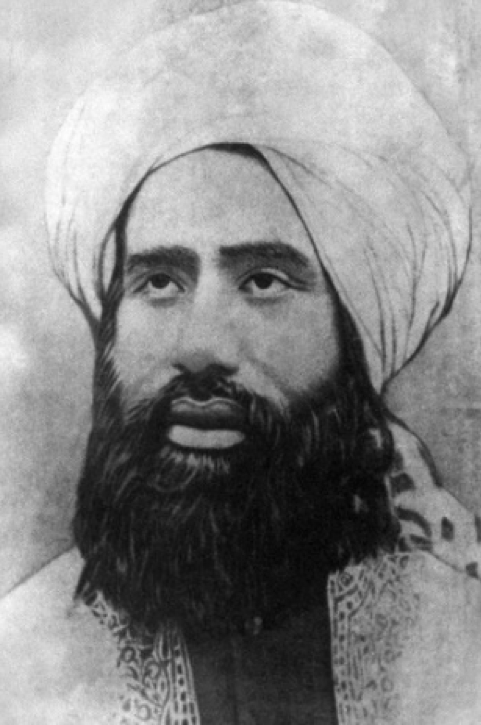
A year and a half after the death of his brother, under Divine direction, he married for a second time into a very respected Syed family of Delhi. At this time, since the Barahin-i-Ahmadiyya had been published, occasional visitors began to arrive to meet him, and Qadian, situated in a remote comer of the land, began once a month or once in two months to have the honour of receiving a guest. The more widely the book was read the farther his fame began to spread. It was a study of this book which made that grand personality to the eminence of whose attainments and learning friends and foes have alike borne unanimous testimony and who in whatever company he chanced to be, invariably impressed it with the superiority of his genius, a lover and devotee of its author. Himself the beloved of thousands it was his pride to be among the disciples of Ahmad.
I, of course, mean my honoured teacher, the late Moulana Maulvi Noor-ud-Din, who at the time of the publication of the Barahin-i-Ahmadiyya was special physician of His Highness the Maharaja of Jammu. It was at Jammu that he had occasion to study the book and he was so much captivated by it, that till the moment of his death he held to his allegiance to the Promised Messiah.
A Divine Mission
The Oath of Discipleship
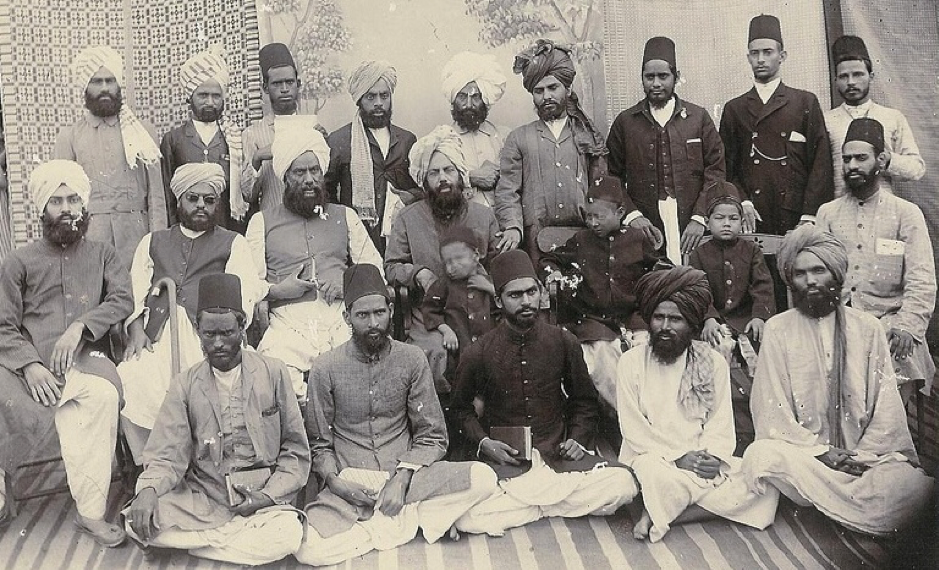
As the renown of the book and of its author, began to spread many a person wrote to him praying that he might accept from them the covenant of discipleship. But he replied that in all things he depended upon Divine guidance and that he had not been directed to initiate disciples. In the month of December 1888, the revelation came to him that he should accept from people the covenant of discipleship. Accordingly the first covenant ceremony took place early in the year 1889 at Ludhiana, in the house of a sincere follower of his named Mian Ahmed Jan and the first to make the covenant was Maulana Maulvi Noor-ud-Din (may God be pleased with him). Altogether 40 persons made the covenant that day.
The Promised Messiah
They were slowly followed by a few others, till in the year 1891 a remarkable event occurred. Ahmad was informed by revelation that Jesus of Nazareth, in whose second advent both the Muslims and the Christians believed, had died a natural death and could not return to the earth in person, and that what was meant by his second advent was that a person should appear in the power and spirit of Jesus and that he himself was that person. When repeated revelations commanded him to publish the same to the world, he had no choice left but to take up the burden. The revelation was received by him at Qadian, and he told the members of his family that the task that had been entrusted to him was sure to arouse fierce opposition. He then proceeded to Ludhiana and issued a manifesto announcing his claims to the Messiahship.
No sooner was the announcement made than there was a great stir all over the country and an unprecedented storm of opposition was raised. Those very theologians who had formerly commended him now stood up to denounce him. Maulvi Muhammad Hussain of Batala, who in his paper lshaat-us-Sunnat had showered very high praise upon him, now moved heaven and earth to thwart him. He wrote: “I was the person who raised this man up and now I will bring him down,” meaning that it was through his support that the claimant had attained to some eminence, but that now he would oppose the claimant so bitterly that he would lose his place in public esteem and would be altogether discredited.
Journeys and Controversies
The said Maulvi in company with some other theologians came down to Ludhiana and challenged the claimant to a debate. This was accepted, but the opponents in the course of the debate adopted tactics to convert it into futile controversy. When the Deputy Commissioner saw that a serious situation was developing which might lead to a riot, he by a special order directed Maulvi Muhammad Hussain to leave the town the same day. Then on the advice of certain friends who apprehended that a similar order might also be issued in respect of the Promised Messiah, the latter also left Ludhiana for Amritsar, where he waited for eight days. It was then ascertained from the Deputy Commissioner that no such order had been issued in respect of him. He thereupon returned to Ludhiana and stayed there for a week and then left for Qadian. After a short stay he went back to Ludhiana for awhile and then proceeded to Delhi and arrived there on the morning of 28th December.
Delhi was at that time considered the centre of learning in India and his opponents had taken measures to rouse the people in opposition to him. No sooner did he reach the city than the Ulema [religious clergy] set up a clamour. They challenged him to an open debate and determined that a discussion should be held between him and Maulvi Nazir Hussain who was the leader of the Ahl-i-Hadis section of Ulema in India. The Juma’ Mosque was fixed as the place of discussion. But all these arrangements were settled by the opponents unilaterally, and no notice of them was given to the Promised Messiah. When the time fixed for the discussion arrived, Hakim Abdul Majid Khan of Delhi came with a carriage and requested the Promised Messiah to proceed to the mosque where the discussion was to be held. The latter answered that in the prevailing state of public excitement there was a likelihood of a breach of the peace, and that, therefore, he could not go to the mosque unless police arrangements were made, and that, moreover, he should have been previously consulted regarding the discussion, and the conditions to be observed by the parties in the debate should have been agreed to. His non-appearance served to increase the public excitement. He, therefore issued a declaration to the effect that Maulvi Nazir Hussain should state on oath publicly in the Juma’ Mosque that Jesus (peace be on him), according to the Holy Quran, was alive and had not died and that if within one year of his statement on oath no divine punishment should overtake him, then the Promised Messiah would be proved false and would burn all his publications. He also fixed a date for the statement.
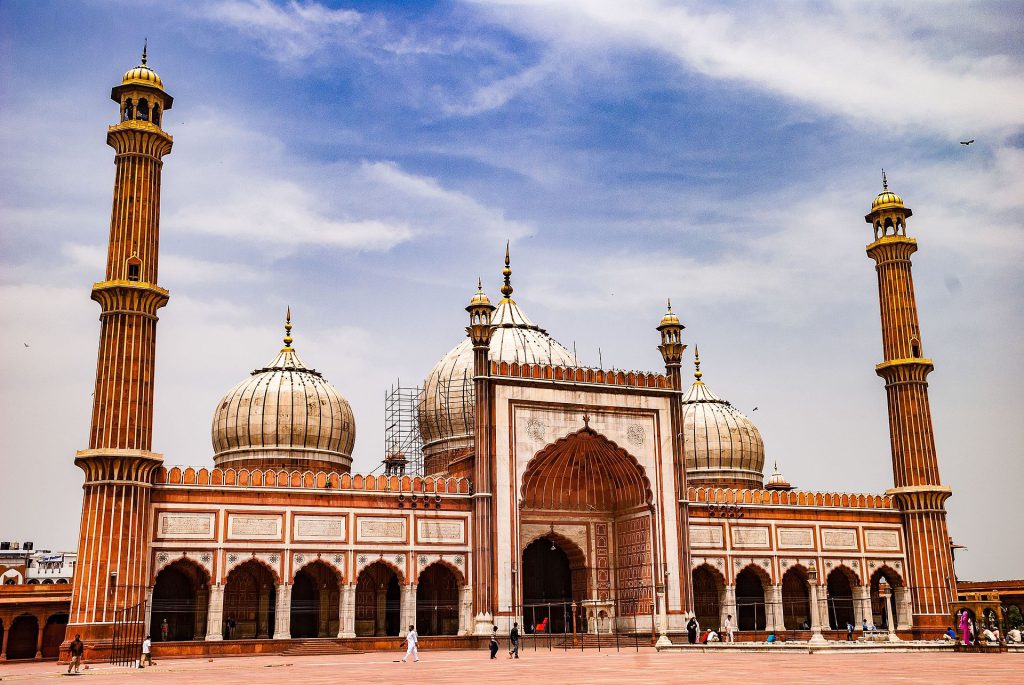
The disciples of Maulvi Nazir Hussain were much perturbed at the proposal and began to put forward all sorts of objections to it. But the people at large were insistent. What harm was there, they asked, if Maulvi Nazir Hussain should hear the proposition of the Promised Messiah and should state on oath that it was false? A great crowd assembled in the Juma Mosque on the day named. People advised the Promised Messiah not to go to the mosque as there was likelihood of a serious riot. Nevertheless he went there, accompanied, as in the case of Jesus, by twelve of his disciples.
The spacious edifice of the Juma Mosque was full of men both inside and out, and even the steps were crowded. Through this sea of men who were mad with rage and looked at him with bloodshot eyes, the Promised Messiah and his little band made their way to the Mehrab [prayer hall niche] and took their seats. For the preservation of order the Superintendent of Police with other police officers and nearly one hundred constables were present. Many in the crowd had collected stones and were prepared at the slightest hint to cast them at him and his party.
Thus would the Second Messiah have been a prey to the wickedness of the Pharisees and Scribes like unto his prototype of Nazareth. Instead of crucifying him the people were bent upon stoning the Second Messiah. They failed to carry their point in the verbal discussion which then ensued. They did not agree to discuss the question of the death of Jesus. None of them were prepared to take the proposed oath, nor would they permit Maulvi Nazir Hussain to do so. Khawaja Muhammad Yousuff, a Pleader of Aligarh, got from the Promised Messiah a written statement of the articles of his faith, and proposed to read it out. But since the Maulvis had falsely given out to the public that he neither believed in the Quran nor in the angels, nor in the Holy Prophet, they apprehended that the recital of his articles would expose their falsehood. They, therefore, again incited the people who created an uproar and Khawaja Muhammad Yousuff was prevented from reading the statement.
The officers of Police, perceiving the gravity of the situation, ordered the constables to disperse the crowd, and announced that no discussion would be held. The gathering thereupon dispersed. The police made a ring round the Promised Messiah and led him out of the mosque. Reaching the gate there was a short delay in getting a carriage. Immediately a crowd gathered and showed signs of excitements. An assault was imminent. Just then the officers put the Promised Messiah into a carriage, got it moving, and then busied themselves in dispersing the crowd. After this the people of Delhi invited Maulvi Muhammad Basheer of Bhopal and a discussion took place between him and the Promised Messiah, a detailed report of which has been printed and published. Some time later the Promised Messiah returned to Qadian. After staying there for a few months he set out on another journey. First he went to Lahore where he had a discussion with Maulvi Abdul Hakim of Kalanour. From there he proceeded to Sialkot, thence to Jullunder and next to Ludhiana, whence he returned to Qadian.
A Debate With the Christians
In 1893 a debate was arranged with the Christians. Their spokesman was Abdullah Atham, a retired Extra Commissioner. The debate was held at Amritsar and continued for 15 days. An account of it has been published under the name of Jang-i-Muqaddas (Holy War). In this debate, as in all others, victory remained with the Promised Messiah, and a very salutary effect was produced upon the public. The debate was carried on in writing. The parties sat confronting each other and wrote out replies to each other’s papers. The original papers have been published in book form. It was apparent that the powerful arguments of the Promised Messiah frequently pushed the Christian advocate into a comer, and compelled him to shift his ground continually. Sometimes he indulged in unjustifiably strong language. The Promised Messiah put forward the salutary principle that claims made on behalf of a faith and arguments presented in support must be adduced from the scriptures of recognized authority of the faith.
A Curious Episode
A curious episode occurred in the course of the discussion which made friends and foes alike admit the transcendent nature of the Promised Messiah’s genius or rather the Divine help which accompanied him. One day, the Christians, in order to embarrass the Promised Messiah, collected a number of maimed and blind people, and in the middle of the session presented them to him, saying that since he claimed to be the Promised Messiah, and the first Messiah (Jesus) used to cure the maimed and the blind, his claims to be the Promised Messiah could be accepted only if he would effect a similar cure. They added that there was no need for him to go far to find the sufferers since they were already at hand.
The call took the assembly by surprise and people wondered how the Promised Messiah would deal with the situation. The Christians were elated and thought that a stunning blow had been dealt and that their opponent had suffered a severe defeat in full view of the assembly.
But when they heard the reply of the Promised Messiah their joy changed into chagrin and self-reproach, and their fancied victory was turned into an utter defeat, and everyone applauded the readiness and appropriateness of the reply.
The Promised Messiah said that the healing of such sufferers by Jesus was an assertion of the New Testament and formed no part of his own conviction or claims. In fact, for him the miracles of Jesus were susceptible of an altogether different interpretation. It had indeed been claimed by the New Testament that Jesus used to effect the physical cure of such ailments and that simply by a touch of the hand, and not by medicine nor by prayer. At the same time it is written that if his followers have but a grain of faith they can perform more wonderful miracles than these. Therefore, it did not lie with the Christians to bring those afflicted ones to him; rather it was he who was entitled to present the sufferers to them and, therefore, with due acknowledgment of their kindness in collecting them, he now presented them to the Christians with the request that, agreeably to the statement in the New Testament, if they had in them faith as a grain of mustard seed, they should place their hands on them and command them to be whole. If they were cured, then he would be convinced that they and their faith were true. If, however, they failed and could not come up to their own pretensions, then no one could possibly believe in their truth. The rejoinder made a great impression and the Christians were altogether dumbfounded and hastened to change the topic.
Shortly after this debate he paid a visit to Ferozepur. During these journeys he was everywhere harassed and persecuted. In addition to the written matter published against him, wherever he appeared the people combined to annoy and torment him.
Promoting Friday Prayer Services
On 1st January 1896 the Promised Messiah inaugurated a movement for the general celebration of the Friday prayer service, which is one of the most beneficent institutions of Islam, and a symbol of its greatness. He made arrangements for the submission of memorial to the Government of India for the closing of Government offices on Fridays. This service was for the Muslims a practical and powerful sign of the advent of the Promised Messiah but unfortunately, misconceptions had begun to prevail among them regarding it and in view of certain conditions attached to the institution, its obligatory nature had begun to be questioned. At many places Muslims had abandoned the celebration of the service.
The Promised Messiah wanted to revive the institution and desired that government offices should be closed on Friday. He resolved to approach the Government with a memorial, but before it could be prepared, the Maulvis characteristically set up an opposition and wanted to take the management of the affair into their own hands. The object of the Promised Messiah was that somehow the great purpose should be achieved and it did not matter through whom. At the instance of Maulvi Muhammad Hussain of Batala, he made a public announcement that if the said gentleman would undertake the responsibility of moving the Government on the question, he was welcome to do so and the Promised Messiah would leave the matter entirely to him. It is to be regretted that Maulvi Muhammad Hussain by this means only succeeded in postponing this very useful measure. The proposal of the Promised Messiah had, however, its origin in a Divine source and ultimately found its fulfilment at the hands of his followers.
Conference of Religions
Towards the end of 1896 certain gentlemen resolved to convene a Conference of Religions at Lahore. They invited the advocates of different religions to take part in it. The invitation was cordially accepted. It was laid down as one of the conditions of participation in the proceedings that no attack was to be made on any creed. The following five subjects were specified upon which the exponents of different faiths were invited to present their thesis:
- The physical, moral and spiritual conditions of man.
- The state of man after death.
- The object of man’s life on earth and the means of its attainment.
- The effect of human actions on this life and the next.
- What are the sources of spiritual knowledge?
The initiator of the conference had come to Qadian to meet the Promised Messiah himself, who had suggested the idea of the conference to the initiator on a previous occasion, when he happened to be on a visit to Qadian. The sole purpose of the Promised Messiah was to acquaint the world with the truth of the message with which he had been sent. He was not actuated by any desire for personal advertisement of display. He, therefore, persuaded the gentleman to try and give a practical form to the suggestions and the first notice of the conference was actually printed and published at Qadian. The Promised Messiah directed one of his disciples to render the gentleman every possible assistance, and himself promised to contribute a paper. When, however, he began to write the paper he suffered a severe attack of diarrhoea. Nevertheless, he completed the paper. While he was engaged in writing it, the revelation came to him, meaning that this paper would excel all others at the conference. Accordingly, he issued a handbill announcing beforehand that in conformity with the revelation his paper would be pronounced the best at the conference.
The sessions of the conference were fixed for the 26th, 27th and 28th of December 1896. Six gentlemen were appointed moderators of the conference. They were:
- Rai Bahadur Pratul Chandra Chatterjee, Judge, Chief Court, Punjab;
- Khan Bahadur Shaikh Khoda Bakhsh Sahib, Judge, small Cause Court, Lahore;
- Rai Bahadur Pandi Radha Krishan, Vakil, Chief Court, late Governor of Jammu;
- Maulvi Hakim Noor-ud-Din Sahib, Physician to H. H. the Maharaja of Kashmir;
- Rai Bahadur Bhavani Darshan, Settlement Officer, Jhelum;
- Sardar Jawaher Singh, Secretary, Khalsa College Committee, Lahore.
Many of the most eminent exponents of different religions had sent their contributions to the conference, which naturally aroused great public interest. People attended the sessions with great eagerness. In fact, the conference had assumed the aspect of a tournament of religions, and the partisans of different creeds desired to witness the triumph of their respective champions. In the circumstances, the older faiths which could already count a large following were sure enough of a favourable response, because there were many in the assembly who could champion their cause. But in the case of the Promised Messiah, his paper was to be read in an assembly where friends were few and opponents many. At that time his followers did not number more than two to three hundred, and of them not more than fifty were present at the conference. His paper was to be read on 27th December between 1:30 and 3:30 p.m.
He could not personally attend the conference, but appointed one of his disciples, Maulvi Abdul Karim, to read the paper on his behalf. That gentleman commenced reading the paper and within a few minutes such a spell fell upon the assembly that they sat listening intently utterly unconscious of the passage of time. When the appointed hour came to an end, the audience was greatly agitated because the reading of not even the answer to the first question had yet been completed. There was, therefore, great joy when Maulvi Mubarak Ali of Sialkot, who was the next speaker, announced that the time fixed for his lecture might be allotted to the Promised Messiah’s paper. Maulvi Abdul Karim accordingly continued with the reading of the paper till 4:30, which was closing hour for the day’s proceedings.
But even the first topic had not yet been concluded and the audience desired that portion might be concluded before the close of the sitting. The moderators accordingly directed that the reading might be continued and accordingly it went on till the first topic was concluded an hour later. Then the audience insisted that the sittings of the conference should be extended by another day beyond the 28th in order to permit the reading of the paper to be completed. Accordingly arrangements were made to continue the sittings on the 29th, and since some of the representatives of other religions had also made requests for additional time. it was announced that on the following day the proceedings would open at 9:30 a.m. instead of 10:30 a.m., and that the reading of the paper of the Promised Messiah would be continued.
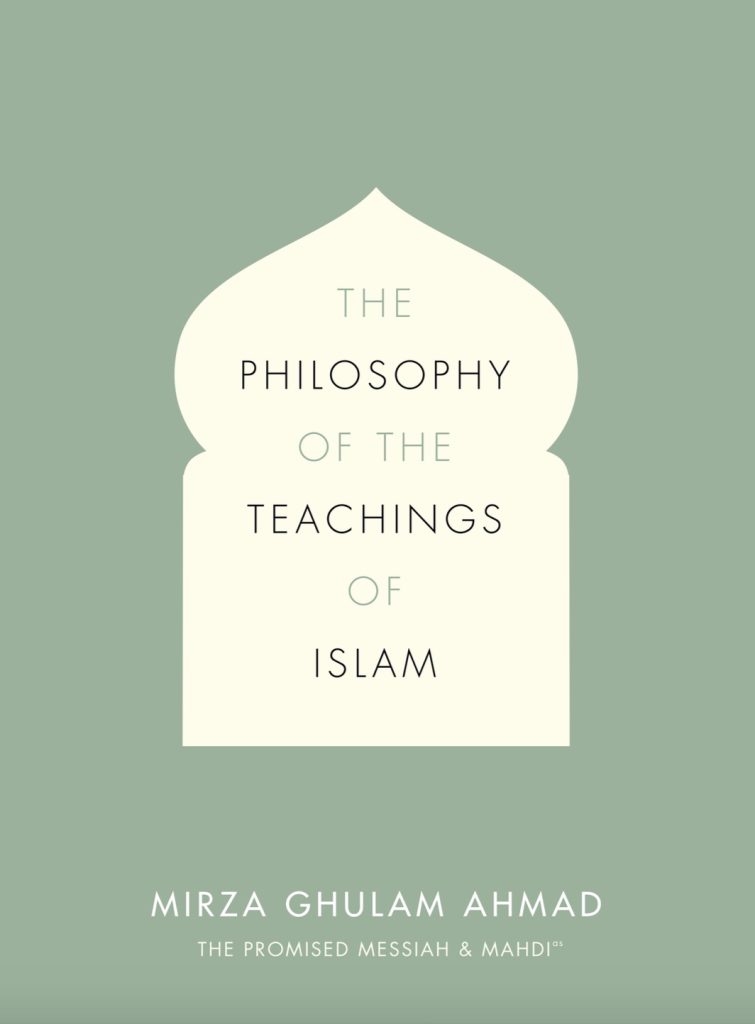
The impression created by the first day’s reading of Ahmad’s paper could be judged by the fact that while on the first two days of the conference the audience did not assemble fully even at 10:30, on the second day of the reading men of all creeds and persuasions were assembled in large numbers by 9:00 and the proceedings commenced punctually at the appointed time. On this day also the period of two and a half hours assigned for the paper proved inadequate, and since the audience with one voice demanded that the reading should be completed, the moderators had no choice but to extend the time once more.
In short, it took altogether seven and a half hours to finish the reading. The paper created a great stir in Lahore and everyone was agreed that it was the best one read at the conference. The followers of all creeds and sects were unanimous in its praise. Those who compiled the report of the conference estimated that during the time that the essay was being read, the audience had gradually swelled to between seven and eight thousand people. In short, this lecture was a great triumph for the Promised Messiah and it further impressed the minds of his opponents with the transcendent quality of his genius. Even adverse newspapers were compelled to admit that the Promised Messiah’s paper excelled all others which were read at the conference. An English translation of it under the title, ‘The Teachings of Islam’ has met with a specially warm reception in Europe and America.
A Challenge
In the beginning of 1897 the Promised Messiah had recourse in another expedient to demonstrate his truth to the Christian world. With a view to prove that Jesus was only human and to establish the baselessness of the Christian doctrine, he made a public announcement inviting the Christians to a forty days contest. The followers of other religions were also included in the challenge. It was, however the Christians to whom it was specially addressed. The challenge was accompanied by the offer of an award of a thousand rupees to the person who could prove that the prophecies made by Jesus were superior and more sublime than those made by the Promised Messiah. The challenge was not accepted by anyone.
Prophecy about Lekh Ram
On 6th March 1897, a member of the Arya community, Lekh Ram by name, was killed in accordance with a prophecy made by the Promised Messiah some years earlier. This caused a great outcry among the members of that community. Needless to say, there was great stir against the Promised Messiah and he was openly charged with murder. The authorities carried out a prompt search of his house in the hope that some clue to the murder might be found, but God foiled all the attempts of his enemies and though every effort was made to involve him in the crime, the Promised Messiah’s innocence was completely established.
Turkish Consul at Qadian
In May 1897 there occurred an event which left its mark on history. Hussain Kami, the Turkish Consul, after several requests for an interview, came to Qadian to visit the Promised Messiah and made a request for special case on behalf of the Sultan of Turkey. The Promised Messiah who had been made aware of certain matters by virtue of his own insight and through Divine revelation, let him know frankly that the condition of the Sultan’s Empire was not sound and that the attitudes and behaviour of the members of the Sultan’s government were unsatisfactory and that in these circumstances the end could hardly be favourable. These observations caused grave offense to the Consul who left the place in high dudgeon and published a letter in one of the Lahore papers grossly vituperative to the Promised Messiah.
The affair created quite a commotion among the Muslims of the Punjab and of India. Subsequent events, however, proved the truth of the Promised Messiah’s words when a number of his prophecies in that context were fulfilled. Hussian Kami himself furnished an illustration of the prophecy: ‘I will cause to be humiliated him who seeks thy humiliation.’ A grave charge was brought against him and he was removed from service. The newspaper which printed his letter and supported it also suffered its share of the punishment. The vicissitudes that afflicted the Sultan’s Empire are a matter of common knowledge.
Ahmad and Dr. Henry Martin Clarke
On 1st August the same year, a Christian Missionary, Dr. Henry Martin Clarke, brought in the Court of Mr. A. E. Martineu, District Magistrate of Amritsar, a charge of abetment of murder against the Promised Messiah. The complainant stated that the Promised Messiah had sent one Abdul Hamid to murder him. The Magistrate issued a warrant for the arrest of the accused, but then discovered that the offense was alleged to have been committed in another district and that he had, therefore, no jurisdiction to issue the warrant.
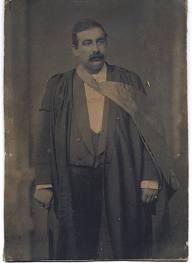
The case was accordingly transferred to the Courts of the District Magistrate of Gurdaspur. This office was then held by Captain M. W. Douglas. Before him also Abdul Hamid stated that he had been sent by the Promised Messiah to murder Dr. Clarke, by crushing him under a heavy stone. Discrepancies between the story now told by him and that told by him to District Magistrate of Amritsar made Captain Douglas suspicious and he began a thorough and sifting enquiry and the case after four hearings was disposed of within the short space of four weeks. Although the complainant and his party were Christians, Captain Douglas gave his impartial verdict in favour of the Promised Messiah, and not only discharged him honourably, but also gave him leave to prosecute the missionaries who had brought the false charge against him. The Promised Messiah, however, forgave them and refrained from proceeding against them. In his order the District Magistrate wrote:
‘When I heard his story it appeared to me to be absurd because, first, there were discrepancies between his statement made before me and that made by him before the District Magistrate of Amritsar, and the conduct and bearing of this man were also suspicious. Secondly, another thing which struck me in the statement was that the longer he stayed with the employees of the mission, the more his statement grew in elaboration and length. For example, he made one statement on 12th August and another on the 13th, and in the latter he added several details which were missing in the former. This made me suspect that either someone was tutoring him or he knew more than he wished to disclose. I, therefore, asked the Superintendent of Police, who was a European officer, to take him out of the mission compound and to keep him in his own custody, and then to record his statement. Accordingly, the Superintendent took him out of the mission compound, and when he asked him for his statement, without waiting for a promise of pardon, he fell at his feet weeping and confessed that he had been coerced into saying all that he had said and that he was weary of his life and was ready to kill himself; that whatever he had said against the Mirza Sahib had been said at the instigation of three Christians, Abdur Rahim, Waris-ud-Din and Prem Das; that he was neither sent by the Mirza Sahib nor had anything to do with him; that the defects that were noticed in the statement made by him on one day he was tutored to ratify on the following day; that he did not even know the face of that disciple of the Mirza Sahib about whom he had stated he had promised to shelter him after the deed; that his instigators made him commit his name and address in memory and lest he should forget it they wrote the name on the palm of his hand, so that he might look at it when need arose. He added that when his instigators had succeeded in persuading him to make his first statement against the Mirza Sahib, they had exultingly exclaimed: We have now got our wish, meaning that they had now caught the Mirza Sahib in a mesh.”
After recording his reasons in detail the District Magistrate discharged the Promised Messiah. The case had given such joy to his enemies that an Arya Samajist lawyer undertook to conduct it on behalf of the missionaries free of charge and several Muslim Maulvis volunteered to give evidence against him. In short, in this case the Christians, the Hindus and Muslims united in a combined attack upon the Promised Messiah and had recourse to reprehensible devices. But God had endowed Captain Douglas with fullness and courage in a far larger measure than was the case with Pilate, and to the last he refused to swerve from the path of Justice. He did not, like Pilate, wash his hands and make the Promised Messiah over to his enemies, but boldly discharged him and thus demonstrated the superiority of British to Roman justice.
Promoting Peace
A Proposal of Peace
During these days the Promised Messiah published a notice under the name of ‘Peace is better’ in which he submitted to the Muslim divines a proposal to the effect that they should desist for a period of ten years from molesting him and should leave him free to fight the enemies of Islam. As they asserted he was an impostor then he was sure within that period to meet with discomfiture; on the other hand if he was righteous in his claim, they would be spared the divine chastisement which invariably overtakes those who set themselves in opposition to the righteous. The Muslim divines, however, did not choose to agree and preferred that he should rather fight them than the enemies of Islam.
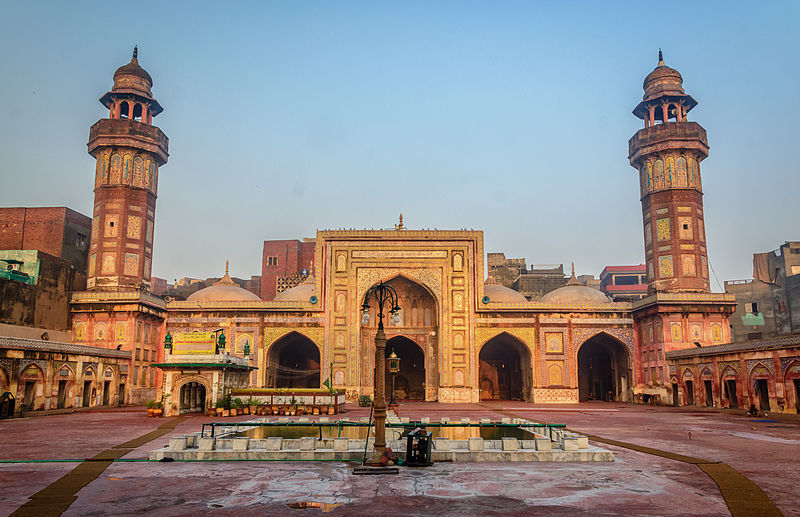
In October 1897 he went to Multan to appear as a witness in a case. During the return journey he halted for some days at Lahore. Here as he passed through the streets, people abused and reviled him. I was with him during the journey and being only eight years of age, I could not understand the reason of this popular hostility towards him. I wondered why it was that wherever he passed people jeered and whistled at him.
I happen still to recall one remarkable instance. I noticed a man, one of whose forearms was missing and a cloth was wrapped round the stump, standing on the steps of Wazir Khan’s mosque. He had also joined the crowd in their shouting with the rest ‘Fie! Fie! the Mirza has fled!’ meaning that the Promised Messiah had disappeared from the field of contest. I was so struck with the spectacle that I put my head out of the carriage window and kept looking at him for a considerable time. From Lahore the Promised Messiah returned to Qadian.
A Great Service to the Cause of Public Peace
The same year the plague appeared in the Punjab and while the other religious leaders opposed the measures which government had adopted for arresting the spread of the epidemic, the Promised Messiah gave them his firm support. He informed his followers that there was no harm in adopting the measures. Rather it was the command of Islam that every means should be adopted which was likely to safeguard public health. By this declaration he rendered a great service to the cause of public peace, for at the time a rumour was current among the people at large that it was the Government which was spreading the plague and that the measures, which were ostensibly aimed at arresting its progress, were actually to spread it and that these measures were also contrary to the tenets of Islam.
As a matter of fact an authoritative pronouncement had already been made by the Ulema to the effect that during the plague it was very sinful to leave one’s house. The Ulema had thus been responsible for the death of thousands of ignorant people. When pills were distributed for the destruction of mice, it was said that the pills brought the plague. When rat-traps were distributed they were also objected to. In short, there was great clamour and at some places public health employees of Government were maltreated. The proclamation by the Promised Messiah at this juncture and the conduct of his followers served to open the eyes of many of the other people. He explained to the Muslims that it was not forbidden in Islam during an epidemic to leave their houses and to dwell outside the affected villages and towns, what was forbidden was to go from one town to another because that tended to carry the infection to those other towns.
The Promised Messiah’s Suggested Remedy for Public Disorder in India
This period was one of great excitement on account of religious controversies and the years 1897 and 1898 were conspicuous in this respect. The opposition to the Promised Messiah was growing and political malcontents were taking advantage of the religious conflicts to excite the people against the Government. It was this state of affairs which led the Government to legislate against sedition in 1897. Nevertheless the country continued to drift towards disloyalty. The law, in fact did not mend matters to any great degree, because India is pre-eminently a land of religions and its people are prone to be more easily agitated over religious questions than over questions of politics. The amending law made no provision for the prevention of religious dispute, as at the time when it was passed, the Government did not perceive the necessity of any such provision. But the point that was missed by the authorities was perceived from his detached vantage point by the Promised Messiah. Accordingly in 1897 he prepared and submitted to his Excellency Lord Elgin, the Viceroy of India, a memorial, which was also printed and publicly circulated, in which he explained to the Viceroy that religious disputes and conflicts were at the root of most disorders and troubles. Religious conflicts created an excitement in the public mind, and mischief mongers took advantage of it and used it against the State.
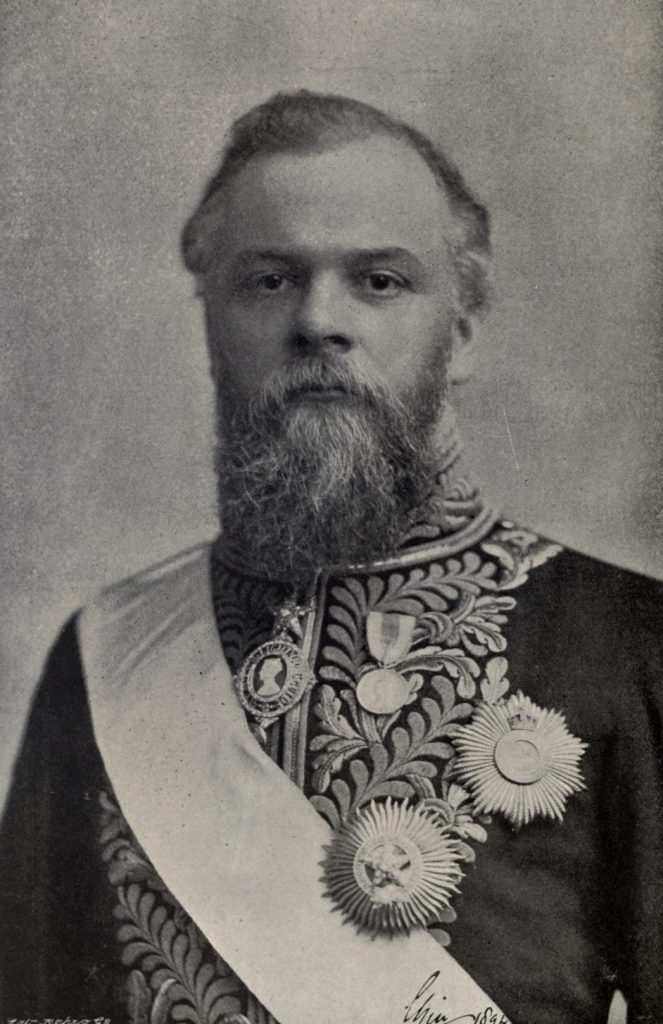
The Promised Messiah, therefore, suggested that the use of abusive and provocative language in religious controversies and discussions should be brought within the range of the law and proposed three means to that end.
- That the law, while leaving the followers of every religion free to proclaim and expound the excellences of their faith, should restrain them from attacking any rival faith. Such a law would leave intact religious freedom and would be free from the charge of showing undue favour to any particular faith. Nor could it give offense to a follower of any faith, refusing him the liberty to attack a rival faith.
- If the above proposal could not be accepted, then it might be forbidden to raise an objection against a rival faith which could equally be raised against one’s own; in other words, it should not be permissible to adduce against a rival faith matters which formed part of one’s own creed.
- If the second proposal was found impracticable, an alternative was suggested that the Government should, in consultation with each community, prepare a list of the authoritative books of its creed, and forbid anyone to raise any objection against the creed save on the basis of the accepted books. When objections are based upon uninformed opinions and baseless stories which are subscribed to by the followers of a creed, the only possible consequence is an increase of rancour and animosity.
If these suggestions had been adopted by the Government at that time the disorder and trouble which occurred in later years could have been forestalled. But at that time Government did not appreciate the need for any such law and its advisors failed to notice the increasing spread of the germs the early activities of which had caught the attention of the prophet of the time. But after the lapse of a full ten years, in 1908, the Government had to pass a law forbidding the followers of one faith from attacking or using harsh or provocative language concerning other faiths. The penalty attached to breach of the law is that the owner of the newspaper printing or publishing the offensive material is called upon to deposit security for future good behaviour or the security already deposited is forfeited. But the law was passed so late that it could not be expected to produce the same result as it could have produced at the time it was proposed by the Promised Messiah. In fact, the root of all trouble in India lies in religious differences and conflicts which, by a strange and shrewd process of manipulation are used by mischief-makers as a handle against the State. Whenever a scurrilous attack is made upon any faith which is naturally dear to its followers, it suits the purpose of the mischief-makers, in order to make the ignorant masses disaffected with the Government, and to pretend that it is all the fault of the Government which permits such persecution and oppression. The masses thereupon, tum away from the real culprits and become disaffected with the Government.
In 1898 a Muslim convert to Christianity published a scurrilous book slandering the names of the Holy Prophet of Islam (peace be on him). This offensive publication greatly agitated the Muslims. The Promised Messiah stated that the agitation would disrupt the peace of the land. A Muslim Association of Lahore prepared a memorial for submission to government demanding that the publication should be banned, but the Promised Messiah advised against the step as it could be construed as an indication of weakness of the Muslim case, and suggested the publication of a strong refutation. But the Association did not listen to his words, and met with the failure foreseen by the Promised Messiah. The stands taken by the Promised Messiah helped to safeguard the inherent right of the Muslims to defend their faith and Muslim holy personages against all attacks.
In the same year, with a view to strengthening the organization of the community and to preserve its distinctive features, he promulgated rules regarding marriage and social relation and forbade marriage of Ahmadi women outside the community.
In the same year he invited the Government to test the truth of his claims by offering to demonstrate it through spiritual signs. This was intended to make his mission fully known to the officials of the State and this purpose was achieved.
Talim-ul-Islam — A High School
In 1898 he also laid the foundation of a High School for the education of the boys of the community and to safeguard them against the unhealthy influences of ordinary schools. During the first year, the school taught up to the Primary Standard, but every succeeding year new classes were added, till in 1903 it presented candidates for the University Matriculation examination.
In 1899 at the instance of his opponents, proceedings for binding him to keep the peace were instituted against him. But as always, his opponents met with great embarrassment and he was fully vindicated.
In 1900 he scored another great success against Christianity. He invited the Anglican Bishop of Lahore, Dr. Lefroy, who had agitated against the Muslim public by delivering a series of provocative lectures against Islam, to a vindication of their respective faiths through acceptance of prayer. The leading organs of the press supported his invitation, but the Prelate did not choose to enter the lists against him.
Ahmadis Formed into Distinct Community
A census was taken in 1901. The Promised Messiah issued a notice to his followers instructing them to record themselves in the census papers under the title of Ahmadi Muslims. Thus he distinguished his followers from the other Muslims by conferring on them the title of Ahmadi.
In the same year some of his relatives who were opposed to him put up a wall in front of his mosque to harass him and his followers. In consequence worshipers were compelled to go to the mosque by a long circuitous route and this caused them considerable trouble and vexation. When persuasion failed to move them from their purpose, the Promised Messiah was left with no choice but to institute proceedings in court in July 1901 to obtain relief. The matter was decided in his favour in the following month. The wall was demolished and they were directed to pay the costs of the proceedings. The Promised Messiah, however, let them off and did not execute that part of the order.
The Review of Religions
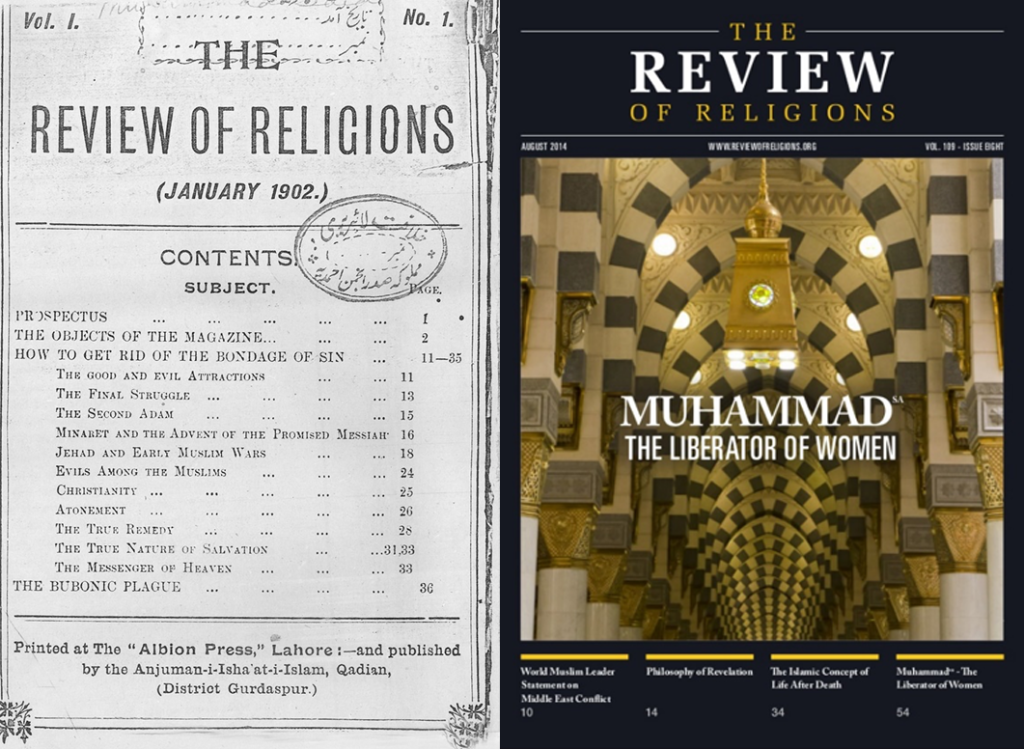
In 1902 he directed that a magazine should be published for the purpose of propagation of Islam in Europe. It was named The Review of Religions and through God’s grace it still carries on the good work. It is published in two editions, in English and Urdu. It has proved to be a very useful medium for the propagation of Islam in Europe and America and friends and foes alike have extolled the excellence of its articles. In its early years, in addition to articles contributed by the members of the community, the Promised Messiah himself wrote for it. He wrote in Urdu and a translation was published in the English edition. These articles produced a very profound impression upon the readers and gave the magazine considerable prominence even in the first year of its publication.
An Inspired Sermon
In the same year on the occasion of the ‘Id-ul-Azha’ (one of the two annual Muslim festivals) which is celebrated on the day after the Pilgrimage, the Promised Messiah, under divine direction, delivered a sermon in excellent Arabic. During its delivery he appeared to be altogether withdrawn from his environment. His face was aglow and awe inspiring to the onlookers. The sermon was superb and its style sublime. The most outstanding Arabic scholars have failed to produce its equal. It is full of the most sublime truths and is replete with profound and exalted ideas. It has been printed and published under the name of ‘Khutba-i-Ilhamia’.
Teaching Arabic
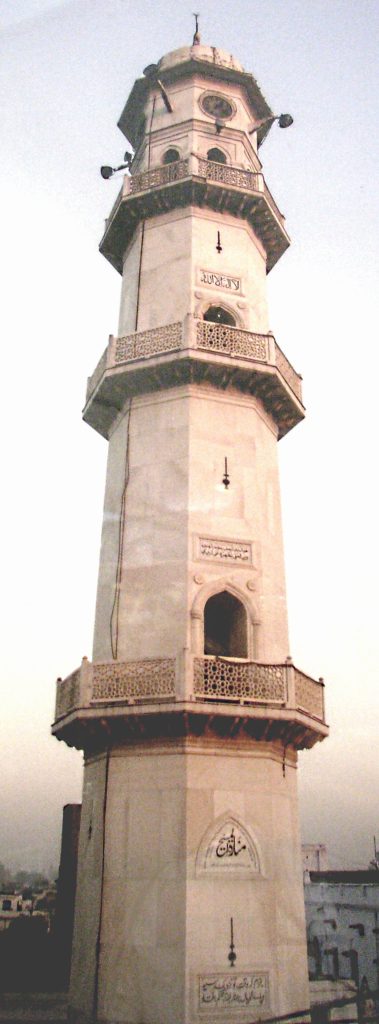
At this time he invited a very simple method for the teaching of Arabic to his followers. This was to compose for them a few sentences in Arabic in a pure and easy style which they were to master and in this way they were gradually to gain familiarity with language. These sentences were related to the daily requirements of life and the nouns and verbs used in them were those in common use. A few lessons were composed in this series, but as more important matters claimed his attention, the project had to be postponed. At any rate he blazed the trail for his followers, which may still be pursued by them.
What he desired was that in every land, in addition to the vernacular, Arabic might form, as it were, a second mother tongue for the Muslims and that both men and women might acquire such familiarity with it as to make it easy for future generations to master the tongue, so that children in their infancy might learn it along with their vernacular. So long as this objective remains unfulfilled, it will not be possible for Islam to be firmly established upon its foundations. People who are not familiar with the language of their religious books can never be fully conversant with their religion, and can never be fully secure against the attacks of the enemies of their faith. People who, for the purpose of acquiring knowledge of their religion, have to depend entirely upon translations gradually cease to possess adequate knowledge of their religion, and their scriptures and to lose their purity. Translation draws people’s attention away from the study of the original, and since translation can never fully replace the original the community drifts away from the true meaning and spirit of the faith. The fulfilment of this wish of the Promised Messiah continues to occupy the attention of his followers and God willing, it one day will be achieved.
Foundation laid of the Minar of the Ancient Prophecy
There is a prophecy of the Holy Prophetsa that the Messiah will descend upon a white minaret to the east of Damascus. The real meaning of the prophecy was that the Promised Messiah would come with the most conspicuous proofs and signs and his glory would shine upon the world and great success would attend him. In the language of dreams a minar signifies clear proofs which nobody can gainsay, and to stand upon a height signifies to attain an eminence which is perceived by everyone and to come in the east means to attain a success which nobody can resist. Yet, out of a desire to fulfil the prophecy literally, the Promised Messiah laid the foundation of a minaret in the Juma Mosque at Qadian in 1902.
Increasing Success
The Beginning of Success
Towards the end of 1902 one Karam Din filed a suit of defamation against the Promised Messiah, who was in consequence summoned to attend the Court at Jhelum. He went there in January 1903. The journey was an augury of the beginning of his success. Although he was proceeding to answer criminal charge, yet there was such a huge concourse of people who came to meet him that they could not be counted, when he alighted at the Railway Station, the gathering was so large that standing room was not available on the station platform. Even outside the station, on the roads huge crowds made it difficult for the carnage to proceed. The authorities were obliged to make special arrangements for the maintenance of order, and Munshi Ghulam Haider, Tahsildar, was put on Special Duty for the purpose. He remained with the Promised Messiah and with much difficulty cleared a passage for the carnage through the crowds which extended right up to the town. In addition to the people of the town, thousands of people from the villages had also come to have a sight of him. More than a thousand people made the covenant of initiation, and when he went to the court there was such a multitude to witness the proceedings that it became difficult to provide room for them. They extended far into the fields. At the first hearing the Promised Messiah was discharged. He then returned home.
That year ushered in a marvellous era of success for the mission, for the Promised Messiah. Sometimes as many as 500 letters of initiation came in on a single day, and the number of his followers rose from thousands into hundreds of thousands. Men in every walk of life made the covenant of initiation and the movement began to spread very fast passing from the Punjab into other provinces and countries.
A Martyr of the New Movement
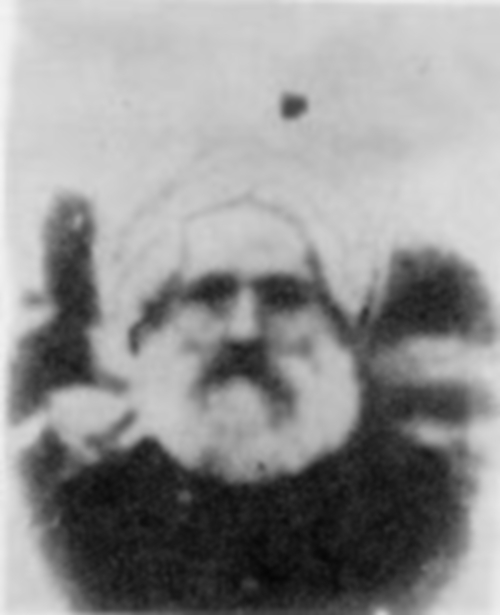
In the same year the community suffered a great bereavement. One of its most prominent members, Sahibzada Abdul Latif, was stoned to death in Kabul on a charge of heresy.
Sahibzada Abdul Latif, one of the first martyrs of Ahmadiyyat.
Harassment in Court and Ultimate Vindication
Persecution through legal proceedings which had apparently come to an end at Jhelum now commenced again with greater vigour. Karam Din, who had preferred a charge of defamation against him at Jhelum, now repeated it at Gurdaspur. The case dragged on to a most extraordinary length and one of the magistrates hearing it was transferred while it was still pending. The dates for the hearings were fixed at such brief intervals that the Promised Messiah was at last obliged to take up his residence at Gurdaspur. The two magistrates who tried the case one after the other were both Hindus and for some incomprehensible reason the proceedings dragged on for too long.
The case turned upon only three or four words. Karam Din had uttered a blatant lie concerning the Promised Messiah and the latter had, in one of his books, referred to him as a ‘Kazzab’ which means both a liar and a hardened liar. He also referred to him as ‘laeem’, which literally means base, but is sometimes used in the sense of bastard. The complainant urged that he had been called a hardened liar and a bastard, whereas the only thing proved against him was that he had uttered a simple falsehood. The court thereupon entered into a lengthy investigation of the various connotations of the words. A few other questions of a like intricacy were also raised and such a lengthy discussion was carried on upon them that almost two years were taken up in coming to a decision.
During the course of the trial a rumour gained currency that the magistrate was under pressure from his co-religionists to take advantage of the situation and to send the accused to jail even if it was only for a day. Friends who heard the rumour came to the Promised Messiah in great perturbation and anxiously reported what they had heard. The Promised Messiah was at that time reclining. As he heard the story a glow came over his face and raising himself slightly on one arm he said with great emphasis: ‘What! Would he lay his hand on God’s lion? If he does that, he shall see what end he comes to.”
It is not known whether the report had any basis in fact, but it so happened that just at that time the magistrate was transferred from the station and was deprived of his criminal jurisdiction and a short while later he was reduced in rank. The magistrate to whose calendar the case was now transferred also spun out the proceedings and though the Promised Messiah was used to being given a chair in the court of the District Magistrate, this magistrate, in spite of the Promised Messiah being seriously indisposed, refused to show him any such consideration. On one occasion, the magistrate would not even allow him to have a drink when he felt thirsty. After a protracted trial he convicted the Promised Messiah and inflicted upon him a fine of Rs. 500.
An appeal was preferred against his finding and was heard by the Sessions Judge of Amritsar, who was a European, Mr. Hurry by name. When he had looked into the record of the case, he expressed his surprise at the magistrate having dragged the frivolous case on to such inordinate length and added that if he had been in the place of the trying magistrate he would have dismissed the case at the first hearing. He held that for a man like Karam Din, a language even stronger than that which had been used by the Promised Messiah would have been appropriate and that the whole proceedings had been highly irregular. After a brief hearing, he acquitted the Promised Messiah and remitted the fine. Thus for a second time a European Judge proved by his conduct the truth that God grants dominion to those whom He finds worthy of it. The case ended in January 1905 and the result fulfilled the revelation made by God some years before to the Promised Messiah regarding the end of the trial.
A Journey to Lahore
Two important journeys were made by the Promised Messiah while the case had been in progress. The first one was to Lahore in August 1904. On this occasion the Promised Messiah stayed at Lahore for a fortnight. People came from all sides in large numbers to greet him and there was not the smallest space left vacant at the Railway Station. During his stay the whole city was in an uproar. From morning till evening a great crowd waited outside the house in which he had taken up his quarters. From time to time opponents would come and abuse him and try to create a row. Some of the more turbulent even attempted to forge an entrance into his private apartments and had to be forcibly ejected.
At the request of his friends at Lahore a public lecture was arranged. The speech was printed and was read in a large auditorium by Maulvi Abdul Karim, while the Promised Messiah sat by. There were from nine to ten thousand listeners. When the reading was over the audience desired that the Promised Messiah should address them a few words with his own lips. In response he stood up at once and addressed the gathering for half an hour. Since it had been known that wherever he went people of every religion and sect, especially the Muslims, displayed keen hostility towards him. The police authorities had, on the occasion, made adequate arrangements for his safety. In addition to Indian police, European soldiers had been requisitioned who were stationed, sword in hand, at short intervals. It had come to the knowledge of the police authorities that some of the rabble had resolved to create a disturbance outside the lecture hall. They had, therefore, taken special precaution to ensure the safety of the Promised Messiah on his return journey from the lecture hall. First rode a number of mounted police. Then came the carriage bearing the Promised Messiah. This was followed by a number of policemen on foot. After them there rode again a number of mounted men and thereafter walked another party of policemen. Thus the Promised Messiah was escorted back to his residence with the greatest possible care and the mischief-makers were prevented from carrying out their designs. From Lahore he returned to Gurdaspur.
Journey to Sialkot
On 3rd October he proceeded to Sialkot. The journey was undertaken at the earnest request of friends of Sialkot who represented to him that as he had spent a few years of his early life in that town, he might, now that Almighty God vouchsafed him such eminent success, once more bless the city with his presence. This journey also afforded another clear indication of the success which had attended the mission of the Promised Messiah. At every one of the intermediate stops such a large number of people came to greet him that it became difficult for the railway authorities to accommodate them. At the Lahore railway station the rush was so great that the platform tickets ran out and at last the station master had to allow in people without tickets. At Sialkot, from the railway station right up to his residence-a distance of over a mile the route was packed with people. The train reached the station at sundown. There was some delay in getting away and before the carriage of the Promised Messiah had proceeded far, darkness set in. The throngs were so thick that there was apprehension of people being run over in the darkness and the police had to take special precautions to keep the road clear. One leading gentleman of Sialkot, an Honorary Magistrate, was assisting the police. It was with great difficulty and by the use of considerable force that he could secure a passage and the carriage could proceed only at a very slow pace. The shutter of the windows of the carriage had been let down. Besides the people who thronged both sides of the street, people also crowded in the shop verandas. Some who could not find room elsewhere clung to the balconies and wooden awnings. On every roof, Hindus and Muslims had lighted lamps in order to catch a glimpse of him. Men and women filled the roofs and when the carriage of the Promised Messiah came near, they held out torches to get a view of his face. Some threw flowers at him.
The Promised Messiah stayed at Sialkot for five days. In addition to discourses which he addressed to such persons as came to meet him at his residence, he delivered onepublic address. This was no sooner announced than the Ulema issued a notice forbidding to attend it. They also accompanied the injunction with a ‘Fatwa’ that whoever listened to the Promised Messiah’s lecture would suffer the dissolution of his marriage. This is a potent instrument, wielded by the Ulema of India whereby they seek to retain their hold upon the ignorant section of the Muslims but for which they have no authority whatsoever.
Not content with issuing the notice, some of the opposing Maulvis announced a lecture as a sort of counterblast in a building opposite to that in which the Promised Messiah was to deliver his address with the object of dissuading people from listening to him. They also posted pickets at the entrance to the auditorium with instruction to proclaim that it was a sin to listen to the address. Some even went so far as to take hold of intending visitors and to draw them away by force. But despite all their endeavours people came in large numbers and when it was known that the Promised Messiah had arrived at the auditorium, people abandoned the lecture of the rival Maulvis and crowded over to the auditorium. Although it was not a holiday, employees of Government came in numbers to attend the meeting.
This address had also been printed in advance and was read out by Maulvi Abdul Karim. While the lecture was in progress some people tried to create a disturbance, but they were promptly put down by the Deputy Superintendent of Police who was a European and who very pertinently asked the Muslims why they were offended with the lecturer, who was speaking in their support and was demonstrating the greatness of their Holy Prophetsa. It was for the Christians, he pointed out, to take offense, for the lecturer was striving to demonstrate the death of their Lord (Jesus Christ). In short, through the vigilance and tact of the police, a disturbance was avoided. One special feature of this lecture was that for the first time the Promised Messiah claimed to fill the role of Sri Krishna (peace be on him) and thus demonstrated the obligation of the Hindus to accept him and his mission.
When the Promised Messiah was returning to his residence, after the lecture, an attempt was made by some people to throw brickbats at him, but the police thwarted it. On the second day after the lecture, the Promised Messiah left for home. On this occasion also all mischief was prevented through the vigilance of the police. When the rabble saw that no opportunity could be found to injure him, some of them went out some distance from the town and waited by the side of the railway line and as the train came up they pelted it with stones, breaking a few of the window panes of some carriages.
Death of Maulvi Abdul Karim
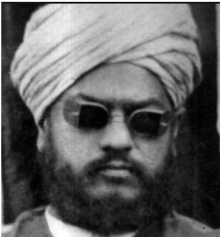
On 11th October 1905, one of the principal disciples of the Promised Messiah, Maulvi Abdul Karim, who had on many occasions been charged with the reading of the Promised Messiah’s lectures, died after a protracted illness. The Promised Messiah directed that a Theological seminary should be established at Qadian to prepare Ulema thoroughly conversant with Islam, who might take the places of those removed by death.
Second Visit to Delhi
A few days after the death of Maulvi Abdul Karim, the Promised Messiah once again proceeded to Delhi and stayed there for nearly a fortnight. Although it was not the same Delhi of 15 years before when its inhabitants had displayed such frantic excitement, yet his presence in the city created great commotion. During the fortnight he delivered no public lecture, but discourses were delivered almost daily at his residence. The accommodation was however, limited and not more than 200 to 250 persons were able to attend at a time. On one or two occasions attempts were made to create a disturbance and on one occasion hostile elements made entry into the place. Nevertheless, the general atmosphere was remarkably better than the one that prevailed during his first visit to the city.
Visit to Ludhiana and Amritsar
On his way back from Delhi the members of the community at Ludhiana persuaded him to stop for a couple of days in their town and he delivered a public lecture there which passed off very well. At Ludhiana a delegation arrived from among the members of the community at Amritsar and prayed that the Promised Messiah should stop for one or two days in that city. The request was granted and on his return from Ludhiana the Promised Messiah broke his journey at Amritsar. The town was full of the opponents of the movement who were very much under the influence of the Maulvis. Instigated by them there was a good deal of excitement. On the day fixed for the lecture his opponents were determined to stop it by every possible means. Accordingly, when the Promised Messiah came to the lecture hall, it was observed that several Maulvis wearing enormous turbans and long cloaks were standing at the gate and with wild gestures were haranguing the people against him. Many of the people carried stones in their overalls. The Promised Messiah entered the hall and began his address. The Maulvis waited in vain for an opportunity to incite the mob. When the address had proceeded for a quarter of an hour or twenty minutes, a friend offered the Promised Messiah a cup of tea as he was suffering from a sore throat and a sip of some hot drink would afford him relief. The Promised Messiah made a gesture of refusal, but as the gentleman persisted with his offer, he took a sip from the cup.
It was the month of Ramadhan. Immediately an outcry was raised by the Maulvis that he was not a Muslim because he did not fast in the month of Ramadhan. The Promised Messiah replied that the Holy Quran had laid down that a person should not fast while suffering from illness or on a journey and that he was both ill and on a journey. But it is difficult to restrain an excited multitude. The tumult went on increasing and despite all the efforts of the police could not be suppressed. At last it was thought advisable that the Promised Messiah should resume his seat and someone was asked to give a poetical recitation. This served to restore calm and then the Promised Messiah stood up to resume his lecture, at which the Maulvis renewed their outcry. As the Promised Messiah tried to continue with his address, the Maulvis incited the people to proceed towards the dais and assault him. The police tried to restrain them, but thousands could not be checked by a few policemen. The mob rushed on like a sea wave and gradually gained ground.
When the police saw the futility of their efforts, they informed the Promised Messiah that they could do no more, upon which the Promised Messiah discontinued his lecture. But this did not allay the excitement. The people persisted in their effort to force themselves upon the dais and to commit an assault. Thereupon the inspector of police requested the Promised Messiah to retire into apartment, and sent a constable to fetch a carriage. Meanwhile, the police restrained the people from entering the apartment. The carriage was brought up to a side door of the apartment and the Promised Messiah proceeded to occupy it. As he was going to seat himself, this became known to the people and such of them as were standing outside the lecture hall advanced towards him and one of them struck at him with a thick heavy staff. One of his disciples who was nearby at once placed himself between the Promised Messiah and the assailant to ward off the blow. Fortunately the carriage door was opened and the staff struck against it and the gentleman escaped with only a slight injury.
As soon as the Promised Messiah had taken his seat the carriage started. The mob rained a shower of stones at it. The window shutters were up, but as the stones struck against them they repeatedly came down. We who were inside the carriage put them up but they as often came down again. We had to hold them to their places but the stones fell with such force that the shutters repeatedly dropped down. Through the grace of God none of us was injured. Only one stone passed through the window and struck my younger brother on his hand. Several of them struck the policemen who were surrounding the carriage. Upon this they struck at the mob and dispersed them from the proximity of the carriage. The police placed themselves both before and behind the carriage and some of them took their seats on its roof and in this manner the carriage was driven quickly to the residence of the Promised Messiah. The people were so excited that in spite of the beating they received from the police they pursued the carriage for a long distance. The following day the Promised Messiah left for Qadian.
Final Years
The Sadar Anjuman
In December 1905 he received a revelation that his end was near. Thereupon he wrote a brochure called Al-Wasiyyat (The Testament) and distributed it among his followers. In this brochure he informed them of the revelation concerning his death and sought to offer them consolation. He also announced the foundation of a cemetery under Divine direction and for people who desired to be interred in it he laid it down as a condition, among others, that they must devise at least a tenth part of their belongings for the propagation of Islam. He also stated that God had given him the glad tidings that only such people would find burial in the cemetery as were destined for a life in heaven. He constituted a committee for taking charge of and administering the properties which those desiring to be buried in the cemetery might bequeath for the spread of Islam.
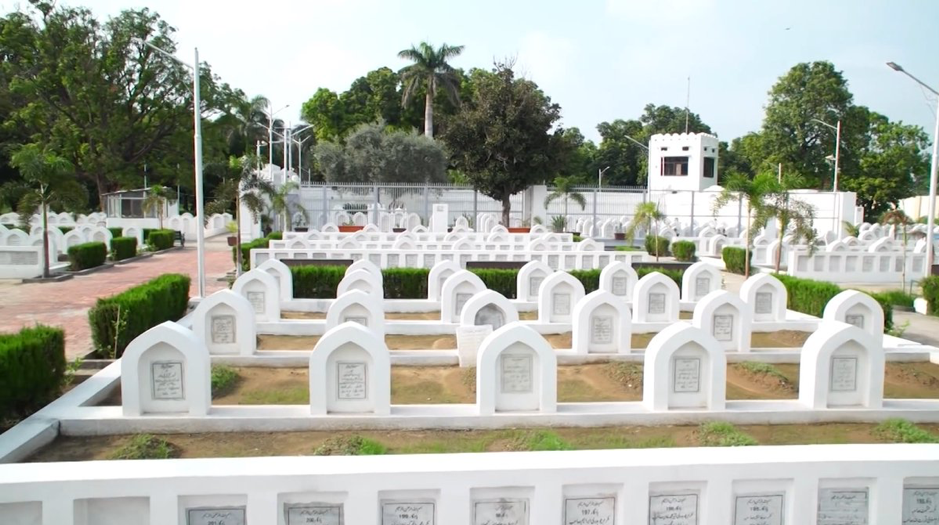
In addition to those arrangements, he prophesied that after his death God would provide for the care and fostering of his movement in the same manner as He had done in the case of the previous prophets. He would raise men to look after the community just as he had raised Hazrat Abu Bakr to look after the Muslims after the death of the Holy Prophet (on whom be peace). Until the publication of the Al-Wasiyyat there were separate Anjumans [Committees] in charge of the management of the school and the magazine. The Al-Wasiyyat created a new Anjuman for the management of the cemetery and of the bequests. Later, at the instance of some of his followers, in December 1906, he converted the last Anjuman which was charged with the administration of bequests into a larger one which was placed in general control of the educational institutions—secular and religious—the Review of Religions, the cemetery and all the other activities; and was designated as the Sadar Anjuman.
Political Agitation
In September 1907 his youngest son, Mubarak Ahmad, died at the age of eight and a half years in conformity to a prophecy which he had published at the time of his birth. The same year steps were taken to establish branches of the Sadar Anjuman in various towns. Two gentlemen and a lady came from America to visit him. With them he had a long conversation in which he explained the purpose of the second advent of the Messiah. That year there was great political agitation all over the Punjab. Some districts were on the verge of an uprising. In view of this he issued a notice to his followers instructing them to remain steadfast in their loyalty to Government and in pursuance of his instruction, in several places, his followers freely lent their services for the suppression of disorders.
Samaj Conference
In December 1907 the Arya Samajists summoned a Religious Conference at Lahore and invited the followers of all religions to participate in it. They laid it down as a condition that the advocate of a religion should not make any attack on any other religion and promised un their own part to abide by the rule. The Promised Messiah was also asked to participate in the Conference. His immediate reaction was unfavourable, as he suspected foul play, nevertheless to leave no room for adverse comment he wrote a paper and sent it to be read at the Conference. In this paper he extended a warm invitation to the Arya Samajists for mutual understanding and observing the utmost possible moderation contented himself with describing the excellence of Islam. Nearly 500 members of the community purchased tickets and attended the Conference; and following their example, other Muslims also attended in large numbers. But when it came to the tum of the Arya Samajists, they foully abused the Holy Prophet of Islam (peace and blessings be on him) and indulged in the wildest vituperation against him. In obedience, however, to the instruction of the Promised Messiah his followers endured this harrowing of their dearest sentiments with patience and nobody even so much as protested against this grave breach of faith.
Financial Commissioner at Qadian
On 21st March 1908, Sir James Wilson, the Financial Commissioner of the Punjab, visited Qadian. As this was the first occasion for such a high official of state to visit the town, the Promised Messiah asked all the members of the community present to extend him a welcome and his tents pitched in the grounds of his school. The Promised Messiah also entertained him as a guest. Since it had been alleged by the opponents of the Promised Messiah that he was secretly disaffected towards the Government and that for this reason, contrary to the traditions of his house, he did not pay court to any of the high officials of state, he availed himself of this opportunity to dispel this groundless suspicion and himself proceeded to pay a visit to the Financial Commissioner.
On this occasion he was accompanied by seven or eight of his disciples. The Financial Commissioner very politely received him at the entrance of his tent and made various enquires about matters concerning the movement. Of the conversation which ensued, one point is worthy of special mention. The Muslim League had only recently been started and the British officials were of the view that it would prove a useful counterpoise to the unhealthy influence of the Congress. Some of the officials went so far as to encourage the members of the aristocracy to join the League.

The Financial Commissioner made mention of the League and asked the Promised Messiah for his views concerning it. He observed that he did not look on the League with favour. The Financial Commissioner then mentioned some of the good points about the League. But the Promised Messiah adhered to his view that such political methods and activities always carried a grave risk. The Financial Commissioner urged that he should not judge the League by the experience of the Congress. The conditions under which the latter had been started were such that even in its inception it could be seen that it was sure to overstep the proper bounds of political activity. But the foundation of the League had been laid by such men and its constitution was such that it could never follow the lead of the Congress. Upon this one of the disciples of the Promised Messiah, Khawaja Kamal-ud-Din, who is the founder of the Woking Mission and is the proprietor of the magazine Muslim India, supported Sir James Wilson’s views and said that he was himself a member of the League and that its rules were such that there was no apprehension of it taking a wrong direction. But in answer to both, the Promised Messiah maintained that to him it seemed that it was sure one day to take on the color of the Congress and that he deemed meddling with politics to be dangerous. The conversation ended here, but every student of contemporary politics is aware that this observation has been proved true to the very letter.
Last Visit to Lahore
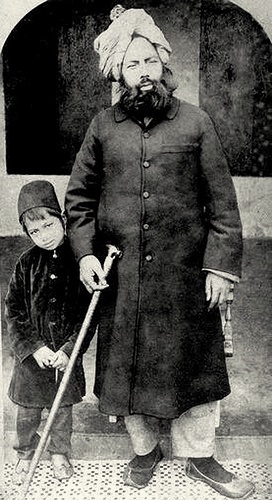
On 26th April the same year he decided, on account of the illness of my mother, to proceed to Lahore. On the night before the revelation came to him: ‘Do not feel secure against the vicissitudes of time.’ Immediately he mentioned the revelation to those about him and—added that it foretold some serious calamity. As it happened, the same night my younger brother, Mirza Sharif Ahmad, fell ill. The journey was therefore postponed for a day. The following day some more members of the party were indisposed. Nevertheless a start was made. When the party reached Batala, the railway station for Qadian, it was discovered that on account of some troubles on the frontier there was a shortage of railway coaches and it had not, therefore, been possible to secure reserved accommodations for the party. The party had therefore to wait at Batala for two or three days. The Promised Messiah suggested to my mother that in view of the revelation foreboding calamity and the impediments which God had thrown in their way, it would seem desirable that they should stay at Batala for a few days. This would suffice to give her a change of air and for treatment a lady doctor could be sent for. My mother, however, wished to be taken to Lahore. No sooner had he arrived than there was a commotion all over the city and as usual the Maulvis all combined in opposition to him. A series of lectures was started by his opponents in an open space close to the house in which the Promised Messiah had taken up residence. The lectures began every day in the afternoon and continued up to nine or ten o’clock at night. In these lectures the most scurrilous abuse was hurled at him and as the only road leading to his residence passed by the open space, the experience was most painful for his followers. The Promised Messiah, however, admonished them that as the abuse did not cause any tangible harm, they should pass by quietly and take no notice of it. Since he had intended to prolong his stay in the city for some time, members of the community began to arrive from every quarter and thus there was always a great concourse in the house. In addition, there were other visitors coming to see him.
An Address to the Wealthy
Since the well-to-do classes in India and for that matter, all over the world are comparatively averse to religion, it was arranged that one of them who was not an Ahmadi, but a great admirer of the Promised Messiah, should invite the leading men of the city to a dinner and that before dinner the Promised Messiah should address them. The address became somewhat lengthy. When one hour had elapsed, one of the guests made a gesture of impatience. On this several other guests said that they were used to having dinner every day but that they had never had a spiritual course spread before them before and that, therefore, the Promised Messiah should continue his discourse. Accordingly, he continued to speak for two hours or more. Regarding this speech, a report was spread that the Promised Messiah had revoked his claim to prophethood. The Lahore Daily Akhbar-i-Aam also gave publicity to this report. Thereupon the Promised Messiah issued a denial and stated that he claimed to be a prophet and had never revoked that claim: what he had denied was that he was the founder of a new dispensation, because the final dispensation was brought by the Holy Prophet (peace be on him) and was still in force.
The Message of Peace
He suffered from chronic diarrhoea. When he came to Lahore the distemper was further aggravated. The constant stream of visitors left his system no time for repose. In this condition he received the revelation meaning: ‘The time for march is nigh: again, the time for marching is at hand.’ The revelation caused great anxiety among his followers, but shortly there came the news of the death of a friend at Qadian and people were reassured, thinking that the revelation had reference to that event. But when someone asked the Promised Messiah he said that the revelation related to a much more important personage and did not refer to the deceased. Made anxious by this revelation: my mother expressed the wish that they should all return to Qadian. ‘To go back now’, he said, ‘is not in my power. Now it is God alone Who can take me back.’ But despite his illness and the revelation he remained devoted to his work.
In this condition he decided to deliver a lecture on the subject of amity and mutual understanding between the Hindus and the Muslims. He wrote out the lecture and gave it the title of ‘The Message of Peace’. The strain of preparing the lecture further weakened his health. The diarrhoea increased. On the night before the writing of the lecture was completed the revelation came meaning ‘Place no trust in this fleeting life.’ He immediately mentioned the revelation to his family and said that it related to himself. The next day the lecture was completed and it was sent to be printed. The following night the diarrhoea increased and he became very weak. He roused my mother. When she came, he was prostrate. In her anxiety she enquired what was the matter with him. The reply was, ‘The same that I have told you about’ (meaning death). After this he had another motion and he became weaker. ‘Send for Maulvi Noor-ud-Din,’ he said: and then, ‘Wake up Mahmood (the present writer) and Mir Sahib (his father-in-law): I slept in a lower room at a slight distance from him. I was called up.
I found him very restless. The doctor had already come and given what help he could. But he did not rally. At last an injection was given. Then he fell asleep. When it was dawn he woke up and performed his morning prayers. His throat was completely hoarse. He tried to speak but could utter no sound. He called for pen and ink, but could not write. The pen dropped from his hand.
He then lay down. Soon a drowsiness came upon him. At about half past ten, his holy spirit passed away to the presence of the August Sovereign, to the service of whose religion he had devoted the whole of his life. To Allah we belong and to Him shall we return. All through there was one word upon his lips and that word was ‘Allah’.
The news of his death spread like lightning over the whole of the city. The members of the community in different places were informed by telegram. The evening papers and those of the following morning carried the news of the departure of this great personage to all parts of India. The magnanimity which marked his conduct in dealing with his opponents will always be remembered: there will also live the memory of the joyous exultation with which his enemies hailed the news of his death. Within half an hour of his death a gathering of the Lahore public assembled in front of the house where his holy body still reposed and began to sing songs of triumph, while others gave expression to their emotions in fantastic masquerading.
The love which his followers bore towards him could be gauged by the fact that many of them, when they saw the holy remains before their eyes were ready to repudiate the evidence of their senses rather than yield to the realization that their beloved one had left them forever. The feelings with which the disciples of the two Messiahs regarded their respective masters thus diverged in that, while for the first the fact that their master had come down from the cross alive was a matter of intense surprise and amazement, for the latter what was most heart-breaking was the fact that their beloved master should depart from them forever. The former could not comprehend how the Messiah was alive, the latter could not realize how the Messiah could die. Thirteen hundred years ago when the Seal of the Prophets departed this life a poet had given- expression to his heart rending grief in the following lines:
‘Thou was the pupil of my eyes, at thy death my eyes have lost their light. After you, let whoever may wish, die. I was fearful only of thy death.
Thirteen hundred years after the passing away of the Holy Prophet (peace be on him) the death of one of his servants exposed to the eyes of heaven the same scene over again that those who had recognized him felt that the world was naught to them and that all their joy had passed away to the other world. Eight years have elapsed since that tragic event. Yet their feelings are still unchanged, their grief still unassuaged. A century may pass by, but they can never lay aside the memory of the days when the beloved prophet of God lived and moved among them.
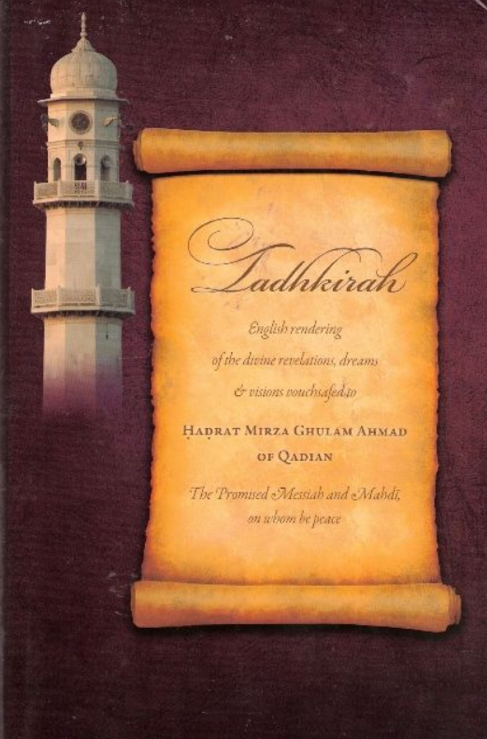
Grief makes one lose one’s balance. In speaking of the death of the Promised Messiah I wandered far from my subject. As I have said he passed away at about half past ten. At once arrangements were made for conveying his holy remains to Qadian, and by evening, with hearts heavy with grief, his followers started by train for Qadian carrying the coffin with them. Thus was the revelation fulfilled which had been already published in several newspapers, i.e. ‘They have brought his body wrapped in sheets.’ From Batala the coffin was forthwith carried to Qadian. Before the burial, the members of the community present at Qadian (including hundreds of representatives from outside) unanimously selected Hazrat Maulvi Noor-ud-Din of Bhera as the successor and Khalifa of the Promised Messiah and swore the oath of allegiance to him. Thus was fulfilled that prophecy published in the Al-Wasiyyat that just as after the passing away of the Holy Prophet (peace be on him) God called Hazrat Abu Bakr to take his place, even so for the followers of the Promised Messiah, God would make a similar provision. Then the Khalifa led the funeral service and the burial took place after midday.
Thus was also fulfilled the revelation. ‘On the twenty-seventh an important event connected with me’ which had been received in December 1902, and had been published at the time in various papers, for his death took place on 26th May and the burial on the 27th. That revelation had been accompanied by another which helped to elucidate its meaning, namely, the time has come. On his death the English and vernacular press of the country in spite of religious differences declared with one voice that in him had passed away one of the greatest men of the age.
Obituaries
A mark of a man is the praise he receives from those who do not see eye to eye with him. The obituaries of Hazrat Mirza Ghulam Ahmad, written by those who did not outwardly accept his claim, bear witness to the purity of his character and the power of his work. The following are excerpts from obituaries paid to the Promised Messiah at the time of his death, written by non-Ahmadis.
Maulana Abdul Kareem Azad—Newspaper Wakeel, Amritsar
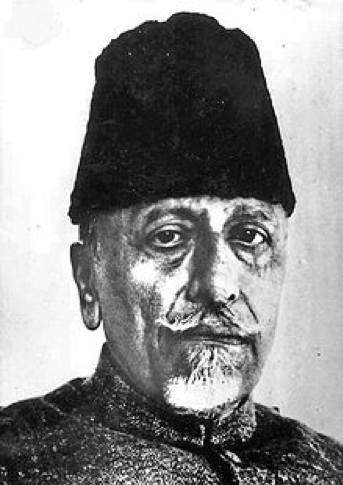
1ST MINISTER OF EDUCATION, INDIA, 1947-1958
“That man—a colossal man—whose pen was magic and diction enchanting, the man who was a paragon of the marvels of mind—whose glance would cast a spell, and whose voice the clarion call of resurrection; one whose fingers were connected with the live wires of revolution, and whose fists were the two charged batteries of electricity, the man who, for thirty years, was like the earthquake and storm to the world of religion; who sounded like the trumpet of doom and continued to awaken those who were deep in the slumber of mortal existence—he departed this world all by himself…. The death of Mirza Ghulam Ahmad Sahib Qadiani is not something from which one may not draw any lesson and just consign it to the ever-receding time, and be content. Such personages who bring about revolutions in the religious or intellectual world, do not always visit this world. They are the pride of human history; their rare appearance on the world scene is very rare, and they depart only after having wrought revolutions in the world.
“In view of his hallmark, that he continued to perform his duty as the General who was destined to be victorious against the opponents of Islam, compels us to register our feelings with full candour, so that the grand movement which, for long, has kept our enemies lying low and trampled over, may continue even in future.
“The literature produced by Mirza Sahib during his confrontation with the Christians and the Aryas bears the seal of popular acclaim — and he needs no introduction in this speciality. We have to heartily acknowledge the value and greatness of that body of literature, now that it has accomplished its task. This is so because we can never efface from the template of our hearts, the time when Islam was surrounded by the incursions of its enemies, and the Muslims whose duty it was to safeguard it — they being in the nature of instruments which constituted the objective world of resources, created by God, the Genuine Protector — they lay sobbing helplessly, after being punished for their own blunders, and they were not doing anything — nor could they do anything — for Islam. On the one hand, the range of onslaughts indicated that the entire Christian World wanted to snuff out the candle which guides one to God, viz. Islam, perceiving it to be an outpost of resistance, getting in the way of their own destination. And the powerful forces of mind and wealth were vying with each other to provide the backing of this assailant. But, on the other hand, the feebleness of defence was such that there did not exist even arrows to fight against the cannons. Neither did the capability to launch an offensive exist, nor was there any potential for self-defence…. Then the Muslim resistance began, of which Mirza Sahib’s contribution forms part. It not only blew to pieces the initial influence secured by Christianity—which was due to the tutelage of the British Government and was, in fact, its mainstay—causing hundreds of thousands of Muslims to escape its much more dangerous and likely-to-succeed attack, but even the magic of Christianity itself started to blow up in smoke….
In short, this service by Mirza Sahib will keep future generations weighed down under debt for having led from the front those engaged in Jihad by the Pen and for having performed the duty of defending Islam and leaving such a vast body of literature that as long as blood courses in the veins of the Muslims, and the defence of Islam remains the hallmark of their national character, this literature will endure.”
[Quoted in Al-Badr, 18 June, 1908, pp. 2-3, cf. Daily Millat, Lahore, 7 January, 1911, pp. 13-15]
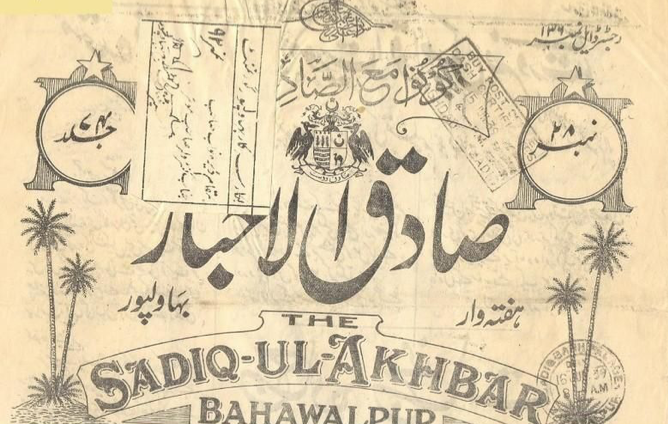
Saadiq-ul-Akhbar, Rewarhi
“Through his forceful declamation and splendid writings, Mirza Sahib has delivered a coup de grace to the lecherous objections raised by the opponents of Islam, and has silenced them forever. He has demonstrated that the truth is, after all, the truth. And there is no doubt that Mirza Sahib left no stone unturned in the service of Islam by himself being the paragon in the defence of Islam. Justice demands that we must mourn the sudden and untimely death of such a stalwart Defender of Islam and a helper of the Muslims, who was a scintillation of erudition—an irreplaceable scholar.”
[Quoted in Al-Badr, 20 August, 1908, p.6, col. 1-2]
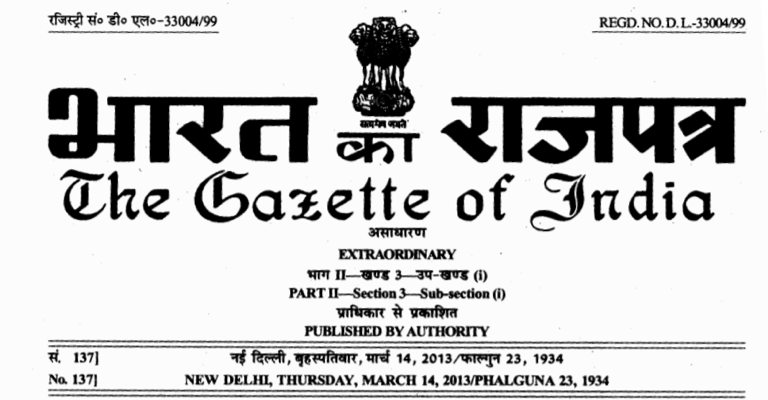
Curzon Gazette, Delhi
The editor of Curzon Gazette, Mirza Hairet Dehlvi wrote:
“The sterling services rendered by the deceased in favour of Islam, against the Aryas and the Christians, are indeed worthy of effusive praise. He completely transformed the style of religious debate, and laid the foundation of modern literature in India. As a Muslim, and also as a researcher, I acknowledge that even the greatest among the great Aryas, or the greatest among the great padres did not have the courage to open his mouth in opposition to the deceased…. Although the deceased hailed from the Punjab, yet his pen possessed such power that there is no writer in contemporary Punjab or northern India who could write with such forcefulness…. His forceful literature is unique in its majesty, there is no doubt that by reading some of his writings one is thrilled in raptures of ecstacy….“
[Quoted in Silsila-eAhmadiyya, p. 189]
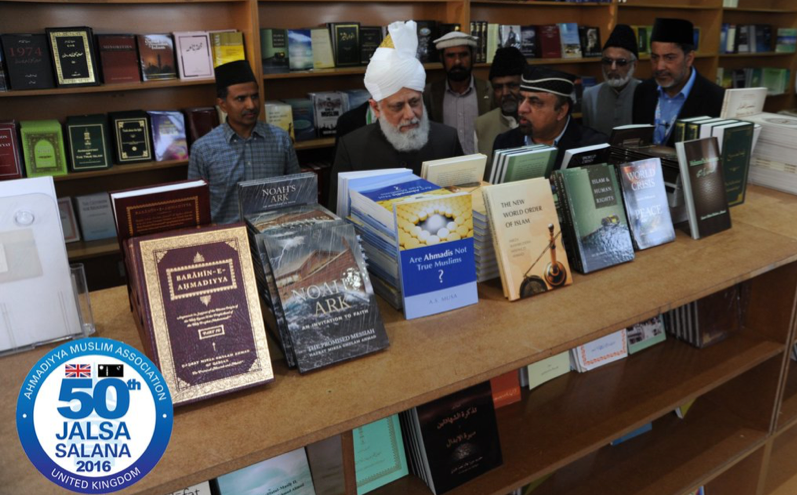
Maulana Sayyed Habib, editor “Siyasat”
“At the time the Aryas and the Christian priests were launching unrelenting attacks against Islam, whatever few religious scholars existed they were sporadically engaged in defending the integrity of the Islamic Shariah, but none achieved any mentionable measure of success. Then Mirza Ghulam Ahmad Sahib entered the arena, and he resolutely positioned himself as the shield of Islam against the Christian padres and Arya preachers. I have already exposed the nature of Mirza Sahib’s claim to Prophethood etc., but, as some [sic. poet] has said:
My faults were all spoken by thee,
Do thou express my skill as well,
So I would mince no words in saying that Mirza Sahib performed this duty with great capability and dexterity, and defanged the opponents of Islam. Some of his writings about Islam are matchless.“
[Tahreek-e-Qadian, pp. 208-209]
Chaudhary Afzal Haq, Mufakker-e-Ahraar

“Before the inception of Arya Samaaj, Islam was a lifeless body which had lost all sensation of the need to proselytise … among the various sects of the Muslims, no organization devoted to preaching could be created. But, of course, there was one man with a heart who rose up in anguish at the neglectful behaviour of the Muslim. He created a small group of adherents around him and leaped forward for the propagation and dissemination of Islam…. He created such a consuming passion for proselytising outreach in his community which should serve as an example for not only all the Muslim sects but also for all the preaching communities of the world.”
[Fitna-e-Irtidaad aur Political Qalabaziyan, sic. “The Menace of Apostasy and the Political Somersaults,” second edition, p. 24]
Contact
National Outreach Department:181 London Rd, Morden SM4 5PT, U.K.
Email: [email protected]Phone: 0208 6877804
@ 2025 Ahmadiyya Muslim Community, All Rights Reserved.